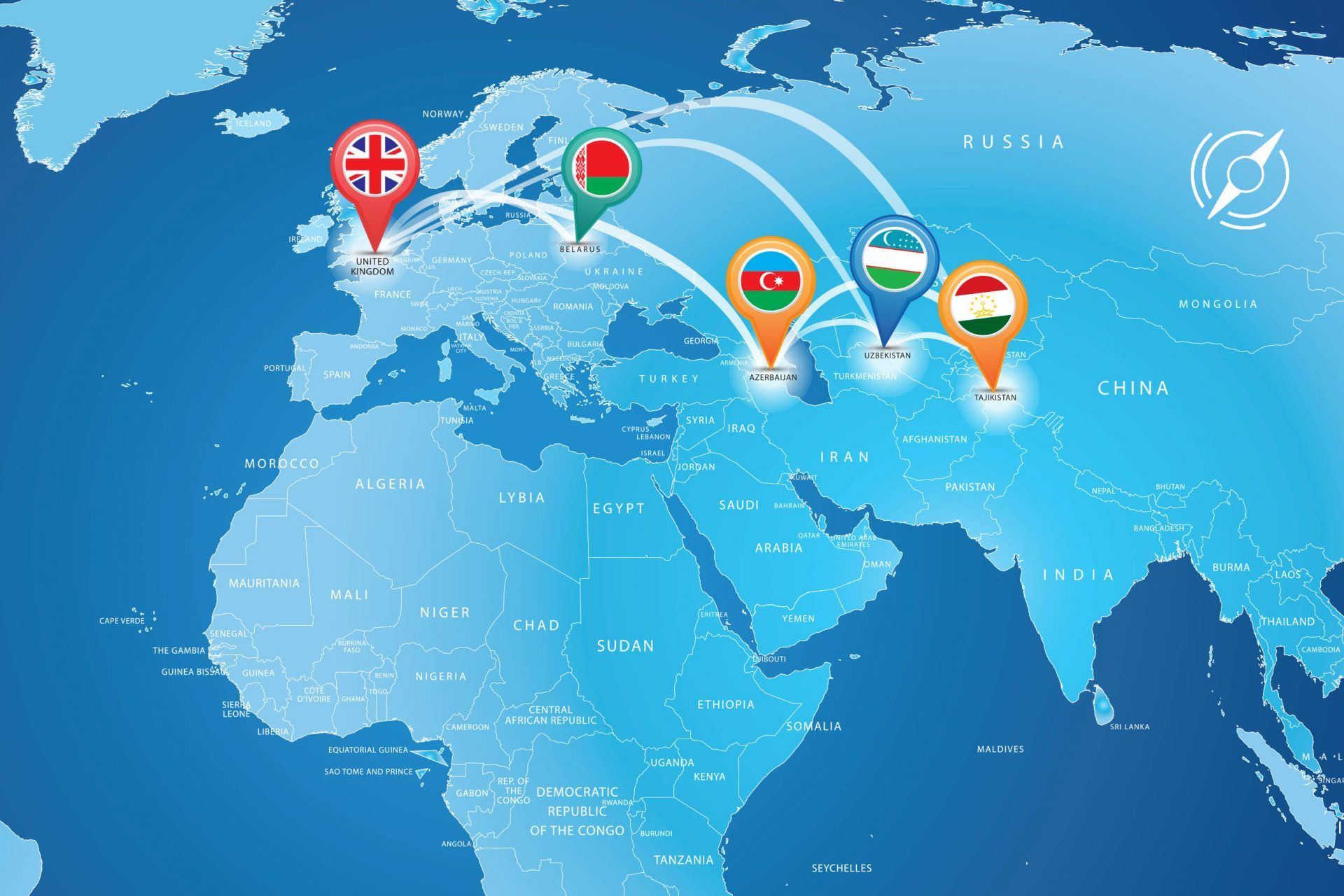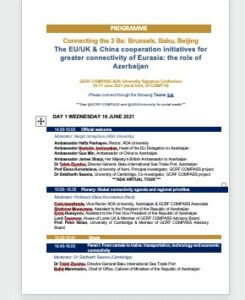The Global Challenges Research Fund (GCRF) COMPASS project has been shortlisted for the International Collaboration of the Year at the Times Higher Education (THE) Awards 2021, widely known as ‘the Oscars of Higher Education’
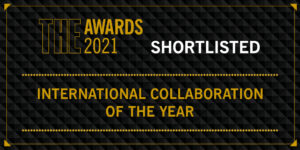 The Global Challenges Research Fund (GCRF) COMPASS project, hosted by the University of Kent in partnership with the University of Cambridge (UK), ADA University (Azerbaijan), Belarusian State University (Belarus), TNU (Tajikistan) and the University of World Economy and Diplomacy (Uzbekistan), has been shortlisted for the International Collaboration of the Year at the Times Higher Education (THE) Awards 2021.
The Global Challenges Research Fund (GCRF) COMPASS project, hosted by the University of Kent in partnership with the University of Cambridge (UK), ADA University (Azerbaijan), Belarusian State University (Belarus), TNU (Tajikistan) and the University of World Economy and Diplomacy (Uzbekistan), has been shortlisted for the International Collaboration of the Year at the Times Higher Education (THE) Awards 2021.
The GCRF COMPASS project works with higher education institutions (HEIs) from former Soviet Republics to develop global partnerships and more sustainable learning capacities through resilience in the face of adversity and crisis. Led by Professor Elena Korosteleva, in partnership with Dr Siddharth Saxena (COI, Cambridge), Rosalind Beeching (Project Manager, Kent) and Prajakti Kalra (Research & Communication Officer, Cambridge), the GCRF COMPASS consortium involves six Research Institutions, 24 members of staff and 100 affiliates. For its success it owes especially to the younger generation of scholars including but not limited to Dr Irina Petrova, Dr Muzaffer Kutlay, Dr Diana Kudaibergenova and Dr Anastasiya Kudlenko for their incredible enthusiasm, dedication and scholarship!
 The project has been recognised by the judge’s panel of THE Awards 2021 for its creative collaborations, imaginative communication of research results, and tremendous achievements in difficult circumstances of war, conflict, uprisings, Brexit and the COVID-19 pandemic. The full press release can be found here.
The project has been recognised by the judge’s panel of THE Awards 2021 for its creative collaborations, imaginative communication of research results, and tremendous achievements in difficult circumstances of war, conflict, uprisings, Brexit and the COVID-19 pandemic. The full press release can be found here.
On 30 August 2021, Professor Elena Korosteleva was invited to speak at the International Conference ‘The New Era and the Development Prospects for Uzbekistan’
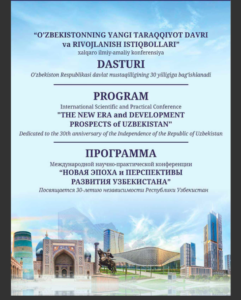
The conference was dedicated to the 30th anniversary of Independence of Uzbekistan, organised by the Academy of Sciences and the Ministries of Foreign Affairs; Higher Education and Culture of Uzbekistan (for full programme see here). Professor Korosteleva spoke about the importance of Internationalisation of Higher Education through capacity-development and partnership-building between the UK and Uzbekistan in particular. She referred to the UK’s integrated review in Security and Defence, and the updated the UK International Higher Education Strategy, and demonstrated its intended outcomes in practice through the success of the GCRF COMPASS project. For full presentation visit here.
On 12 August 2021, Professor Elena Korosteleva was invited to speak at the webinar ‘Political prisoners: steps to release and rehabilitation’, organised by Svetlana Tikhanovskaya’s Belarus Analytical Centre.
The magnitude of oppression in the country is staggering: in the first three post-election days in august 2020, 7,000 were interned; there are now over 40,000 imprisoned; 630 political prisoners; 5,000 are facing criminal charges; between 8 to 15 are dead. People live in fear of torture and humiliation on a daily basis; there are operating concentration camps in the country – formally known as Medical & Labour Dispensaries – whose sole purpose is to ‘re-educate the sharp-heeled’. This is all happening at the geographical heart of Europe – Belarus. For more information, visit: https://www.politzek.me/; and https://dissidentby.com/en/help?page=8.
Elena Korosteleva, Professor of International Politics in the School of Politics and International Relations, appeared on Channel 4 News and LBC on 03 August 2021 commenting on the recent international political developments on Belarus:
‘The two recent incidents, one at the Olympics involving a Belarusian athlete Kristina Timanovskaya, who has sought asylum in Poland, and the death under suspicious circumstances of Vitaly Shishov, Head of the Belarusian House in Ukraine, a humanitarian charity providing support for Belarusians fleeing from persecution, demonstrates President Lukashenko’s continuing disregard for international law, norms and values’.
It has been a year since the disputed presidential election in Belarus, which declared the incumbent, Alexander Lukashenko, who has been in power for over 26 years, a winner again, with 80.1% of the vote; while Svetlana Tikhanovskaya, a single opposition leader, who stepped in at at the last minute to replace her imprisoned husband, reportedly gathered only 10.1%. The huge discrepancy between the official and alternative figures registered by digital platforms Golos, Zubr and Chestnye Lyudi was so stark that it caused a massive backlash throughout the country with hundreds of thousands of Belarusians gathering for peaceful protests in Minsk and other major cities. The authorities responded with unprecedented levels of violence which shocked the nation and the world. Numerous videos shared on social and independent media recorded OMON’s (state security forces) appalling brutality beating up thousands of people, including children and the elderly. A year on, around 45,000 people have been detained, fined and sentenced for up to several years in prison; 600 people are registered as political prisoners with some of them facing trial and the death sentence. The authorities are building concentration camps as they are running out of space for political activists. Belarus can legitimately be classed as a rogue state, as since August 2020 over 30000 people have been interned in prison.
Kristina Timanovskaya, a Belarusian sprinter, refused to follow orders from her coaches telling her to perform the 4x400m relay which she has never specialised in, at the Olympic Games in Tokyo. She was ordered to come back to Belarus, which she rejected pleading for help from the International Olympic Committee. She was subsequently granted a humanitarian visa by Poland, and left the Olympics under the protection of Japanese police.
Vitaly Shishov was lately found hanged in a Kiev park, his body displayed marks of abuse and severe beating. The case is similar to the other activists found dead in Minsk after challenging the Belarusian authorities.
Svetlana Tikhanovskaya met with Boris Johnson and Dominic Raab to discuss the situation in Belarus and to ask for firmer and stronger support from the international community. The Prime Minister said the UK stands in solidarity with the people of Belarus and will continue to take action to support them.
Professor Elena Korosteleva, Professor of International Politics, School of Politics and International Relations, and Director (Professional Studies), Global Europe Centre.
The link to the programme is here: https://www.channel4.com/news/belarus-opposition-activist-found-dead-in-ukraine-park
Cambridge Roundtable on Sustainable Development in the Caucasus, Uni of Cambridge, 28 July 2021
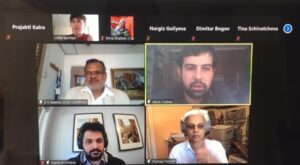 This policy roundtable brought together multiple stakeholders from the region and beyond to discuss these challenges, which equally constitute opportunities with prospects for prosperous sustainable development of the societies and states in the Caucasus. The panels were on Infrastructure Development and Sustainable Use of Resources in the Caucasus; Social and Economic Development in the Caucasus: What are the Common Priorities?; Capacities and Potential of Research and Human Capital Development Institutions in the Caucasus; and Need for Scientific and Regional Development Cooperation.
This policy roundtable brought together multiple stakeholders from the region and beyond to discuss these challenges, which equally constitute opportunities with prospects for prosperous sustainable development of the societies and states in the Caucasus. The panels were on Infrastructure Development and Sustainable Use of Resources in the Caucasus; Social and Economic Development in the Caucasus: What are the Common Priorities?; Capacities and Potential of Research and Human Capital Development Institutions in the Caucasus; and Need for Scientific and Regional Development Cooperation.
Eurasian Science Diplomacy Workshop, Uni of Cambridge, 23rd July 2021
Cambridge co-organised a roundtable on Eurasian Science Diplomacy with School of International Studies at Jeonbuk National University (Republic of Korea) on 23 July. This was the last session as part of the two year collaboration project with Korea, Russia and Kazakhstan which was designed to further the understanding of scientific diplomacy in Eurasia. The main aim was to have a conversation with scientists who worked in the Soviet Era and post 1991 along with younger scientists who spoke about their experiences in more recent times. The goal was to locate this discussion in a larger conversation of the project that delves into Science, particularly Eurasian science and how political diplomacy or the lack of can use the methods and tools of scientific collaborations towards diplomatic relations.
International Conference on Regional Connectivity of Central and South Asia, UWED, Uzebkistan 15-16 July 2021
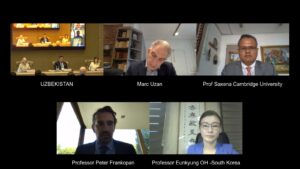 Dr Saxena was invited to speak at the The International Conference “Central and South Asia: Regional Connectivity. Challenges and Opportunities”on 15-16 July 2021 at the initiative of the President of the Republic of Uzbekistan Shavkat Mirziyoyev. The forum aimed at strengthening historically close and friendly ties, trust and good-neighborliness between Central and South Asia in the interests of all peoples and countries of both regions.The conference was attended by the President of the Republic of Uzbekistan, the President of the Islamic Republic of Afghanistan, the Prime Minister of the Islamic Republic of Pakistan, foreign ministers and high representatives of the Central and South Asian countries, other foreign states, heads of authoritative international and regional organizations, global financial institutions and companies, leading research and analytical centers. During the plenary and breakout sessions, the forum participants discussed the possibilities of promoting initiatives aimed at developing trade, economic, transport, communication, cultural and humanitarian cooperation in the context of further deepening regional connectivity. The agenda included a comprehensive exchange of views and joint development of proposals for enhancing cooperation in trade, investment, transport, energy and innovation, green technologies, implementation of specific projects and cooperation programs, enhancing interaction in tourism, education, healthcare, science and culture, ensuring the stability and security of the two regions. Prajakti Kalra also participated in the conference.
Dr Saxena was invited to speak at the The International Conference “Central and South Asia: Regional Connectivity. Challenges and Opportunities”on 15-16 July 2021 at the initiative of the President of the Republic of Uzbekistan Shavkat Mirziyoyev. The forum aimed at strengthening historically close and friendly ties, trust and good-neighborliness between Central and South Asia in the interests of all peoples and countries of both regions.The conference was attended by the President of the Republic of Uzbekistan, the President of the Islamic Republic of Afghanistan, the Prime Minister of the Islamic Republic of Pakistan, foreign ministers and high representatives of the Central and South Asian countries, other foreign states, heads of authoritative international and regional organizations, global financial institutions and companies, leading research and analytical centers. During the plenary and breakout sessions, the forum participants discussed the possibilities of promoting initiatives aimed at developing trade, economic, transport, communication, cultural and humanitarian cooperation in the context of further deepening regional connectivity. The agenda included a comprehensive exchange of views and joint development of proposals for enhancing cooperation in trade, investment, transport, energy and innovation, green technologies, implementation of specific projects and cooperation programs, enhancing interaction in tourism, education, healthcare, science and culture, ensuring the stability and security of the two regions. Prajakti Kalra also participated in the conference.
Central Asia: Regional Security as a Process
Valdai Discussion Club publication by Ulugbek Khasanov (15 July 2021):
The problems in Afghanistan have obviously dominated the approach to security in Central Asia over the past 40 years since the Saur Revolution. This is why the entire context and results of the June 2021 summits of the G7, NATO, US-EU and US-Russia came down to a number of strategically important issues on the global agenda in which Afghanistan occupied a key role, writes Ulugbek Khasanov, Head of Regional Security & Conflicts Study Lab., University of World Economics & Diplomacy, Uzbekistan. Full article is available here.
1-2 July 2021 – Oxford Desert Conference
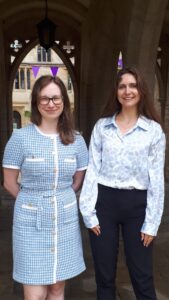 On 1-2 July 2021, University of Kent PDRA Dr Irina Petrova and GCRF Doctoral fellow Ms Polina Bishenden attended the Oxford Desert Conference. The conference was organised by Dr Troy Sternberg and Dr Ariell Ahearn, School of Geography and the Environment (University of Oxford) and brought together scholars focusing on environmental, social and political aspects of drylands. Two-day discussions covered deliberation for unrepresented, indigenous and mobile peoples, pastoralism, natural hazards, desert representations, governance challenges and the impact of Covid-19. Further information about the conference is available here.
On 1-2 July 2021, University of Kent PDRA Dr Irina Petrova and GCRF Doctoral fellow Ms Polina Bishenden attended the Oxford Desert Conference. The conference was organised by Dr Troy Sternberg and Dr Ariell Ahearn, School of Geography and the Environment (University of Oxford) and brought together scholars focusing on environmental, social and political aspects of drylands. Two-day discussions covered deliberation for unrepresented, indigenous and mobile peoples, pastoralism, natural hazards, desert representations, governance challenges and the impact of Covid-19. Further information about the conference is available here.
The British-Kazakh Society Panel Discussion, 30 June 2021
The British-Kazakh Society hosted a webinar on the theme ‘Dynamic Degrees: Unpacking Advanced Qualifications and Skills Pathways for Scientific and Industrial Development’. This webinar was a conversation with Dr. Ainur Seitkan from Astana International University on dynamic degrees, advanced qualifications, and potential pathways for scientific and industrial development in Central Asia, Kazakhstan. The moderator was Dr S S Saxena, University of Cambridge.
25 June 2021 – ‘Preventing governance breakdown in the EU’s neighbourhood: Fostering resilience to strengthen security perceptions’– Dr Eric Stollenwerk
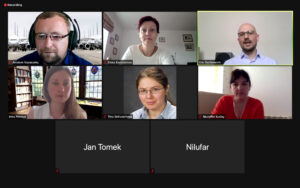 On 25 June 2021 the University of Kent team hosted WiPS webinar with Dr Eric Stollenwerk (German Institute for Global and Area Studies (GIGA) in Hamburg, Germany). The presentation focused on the European Union’s southern neighbourhood. The security situation of many citizens in this region is uncertain and local populations frequently feel insecure, which is an indication of governance breakdown. Resilience has become a new focus in preventing a breakdown of governance. Yet, the extent to which resilience can help prevent governance breakdown remains unclear. Building on original survey data from Libya and Tunisia the presentation contributed empirical evidence to the debate. It shows that limited statehood and order contestation do not necessarily lead to a breakdown of governance. Social trust and the legitimacy of governance actors are two main sources of resilience helping to prevent a breakdown of governance.
On 25 June 2021 the University of Kent team hosted WiPS webinar with Dr Eric Stollenwerk (German Institute for Global and Area Studies (GIGA) in Hamburg, Germany). The presentation focused on the European Union’s southern neighbourhood. The security situation of many citizens in this region is uncertain and local populations frequently feel insecure, which is an indication of governance breakdown. Resilience has become a new focus in preventing a breakdown of governance. Yet, the extent to which resilience can help prevent governance breakdown remains unclear. Building on original survey data from Libya and Tunisia the presentation contributed empirical evidence to the debate. It shows that limited statehood and order contestation do not necessarily lead to a breakdown of governance. Social trust and the legitimacy of governance actors are two main sources of resilience helping to prevent a breakdown of governance.
24 June 2021 – ‘Eurasian integration projects: From organizations to initiatives’ – Prof. Roza Turarbekava
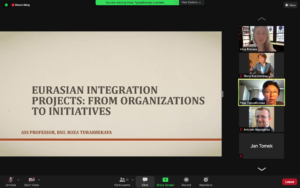 On 24 June 2021 the University of Kent team hosted WiPS webinar with Prof. Roza Turarbekava (Belarusian State University). Roza discussed the Eurasian integration projects proposed since 2000 (Eurasian Economic Community, Customs Union, Common Economic Space, and Eurasian Economic Union). She argued that the absence of a core of values and the problem of the transition period from a planned economy to a market economy, as well as the difference in the strategy of political development, do not provide a solid basis for the creation of the Union. However, the social and political demand for the integration of the Eurasian space continues to persist. Therefore, initiatives such as the Eastern Partnership and the Belt and Road Initiative are becoming more attractive.
On 24 June 2021 the University of Kent team hosted WiPS webinar with Prof. Roza Turarbekava (Belarusian State University). Roza discussed the Eurasian integration projects proposed since 2000 (Eurasian Economic Community, Customs Union, Common Economic Space, and Eurasian Economic Union). She argued that the absence of a core of values and the problem of the transition period from a planned economy to a market economy, as well as the difference in the strategy of political development, do not provide a solid basis for the creation of the Union. However, the social and political demand for the integration of the Eurasian space continues to persist. Therefore, initiatives such as the Eastern Partnership and the Belt and Road Initiative are becoming more attractive.
Graduate and Researcher College Prizes 2021
Early Career Research Staff Prize
 Dr Irina Petrova, GCRF Compass Project “Being part of the exiting GCRF COMPASS project alongside its Principal Investigator and the best mentor I could wish for, Prof. Elena Korosteleva, has been a tremendous learning experience for me.
Dr Irina Petrova, GCRF Compass Project “Being part of the exiting GCRF COMPASS project alongside its Principal Investigator and the best mentor I could wish for, Prof. Elena Korosteleva, has been a tremendous learning experience for me.
 Elena has been an endless source of inspiration, support, and kindness, helping me to develop my research and societal impact skills. I, therefore, would like to dedicate this Prize to her.” ‘With her research, she has evidenced her exceptional contribution to research excellence, policy impact and academic citizenship at Kent’, noted Dr Nadine Ansorg, Head of School. Professor Elena Korosteleva, who nominated her for the prize, commented: ‘Dr Irina Petrova is an exemplary young professional. Her incredible skills, knowledge, kindness and commitment to the GCRF COMPASS project, which goes beyond the call of duty, unreservedly deserve the University’s recognition as an outstanding Early Career Scholar. This award also recognises a unique opportunity presented by the projects like COMPASS, for young scholars to take their career and competencies to new professional levels. Well done!’ A full list of Graduate and Researcher College Prizewinners is available here.
Elena has been an endless source of inspiration, support, and kindness, helping me to develop my research and societal impact skills. I, therefore, would like to dedicate this Prize to her.” ‘With her research, she has evidenced her exceptional contribution to research excellence, policy impact and academic citizenship at Kent’, noted Dr Nadine Ansorg, Head of School. Professor Elena Korosteleva, who nominated her for the prize, commented: ‘Dr Irina Petrova is an exemplary young professional. Her incredible skills, knowledge, kindness and commitment to the GCRF COMPASS project, which goes beyond the call of duty, unreservedly deserve the University’s recognition as an outstanding Early Career Scholar. This award also recognises a unique opportunity presented by the projects like COMPASS, for young scholars to take their career and competencies to new professional levels. Well done!’ A full list of Graduate and Researcher College Prizewinners is available here.
GCRF COMPASS ADA Conference ‘Connecting the 3Bs: Brussels, Baku, Beijing. The EU/UK & China cooperation initiatives for greater connectivity of Eurasia: the role of Azerbaijan
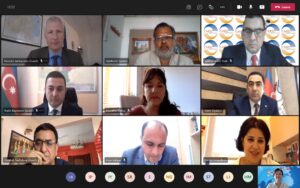 On 16-17 June 2021, under the aegis of the GCRF COMPASS project, ADA University organised its first 3B signature conference to focus on the issues of connectivity – from the global to the local – and the role of Azerbaijan. The online conference attracted over 100 attendees, and included academics, policy-makers and practitioners. It was opened by welcome speeches from Dr Anar Valiyev (Dean of SPIA), EU Ambassador Kestutis Jankauskas, Dr Taleh Ziyadov(Director-General Port of Baku), Prof. Elena Korosteleva (COMPASS PI, Kent), and Dr Siddharth Saxena (COMPASS COI, Cambridge), and was followed by the plenary session which examined the global connectivity agenda and its challenges. The subsequent panels addressed the various dimensions of connectivity ranging from green and sustainable energy, transport and economic infrastructures to political and inter-cultural connections. A more detailed report and the full programme can be found here.
On 16-17 June 2021, under the aegis of the GCRF COMPASS project, ADA University organised its first 3B signature conference to focus on the issues of connectivity – from the global to the local – and the role of Azerbaijan. The online conference attracted over 100 attendees, and included academics, policy-makers and practitioners. It was opened by welcome speeches from Dr Anar Valiyev (Dean of SPIA), EU Ambassador Kestutis Jankauskas, Dr Taleh Ziyadov(Director-General Port of Baku), Prof. Elena Korosteleva (COMPASS PI, Kent), and Dr Siddharth Saxena (COMPASS COI, Cambridge), and was followed by the plenary session which examined the global connectivity agenda and its challenges. The subsequent panels addressed the various dimensions of connectivity ranging from green and sustainable energy, transport and economic infrastructures to political and inter-cultural connections. A more detailed report and the full programme can be found here.
Policy workshop ‘Zangazur Corridor: The importance of connectivity for rebuilding the pax-Caucasian region’, 15 June 2021
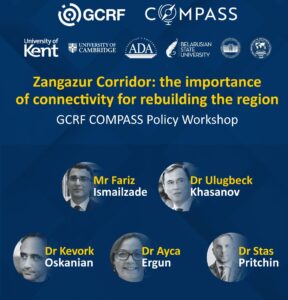 On 15 June 2021, the policy workshop ‘Zangazur Corridor’, organised by ADA University, under the aegis of the COMPASS project, brought together scholars from Azerbaijan, Armenia, Russia, Turkey and Uzbekistan. It focused on discussing opportunities and challenges of transport connectivity between Azerbaijan and Armenia (via Zangazur), and normalisation of relations between the two neighbours. The speakers included Fariz Ismailzade (Vice-Rector, ADA University); Kevork Oskanian (Honorary Research Fellow, University of Birmingham); Ayca Ergun (Assistant Professor, Middle East Technical University), Stanislav Pritchin (Senior Research Fellow, IMEMO RAS), and Ulugbeck Khasanov (Professor, UWED). The speakers underscored the importance of mitigating ontological insecurity in the region, by way of bringing in commercial connectivity projects, paying heed to cultural sensitivity of historical animosities and looking constructively into the future and the common good for all parties concerned. More information about the programme and participants available here.
On 15 June 2021, the policy workshop ‘Zangazur Corridor’, organised by ADA University, under the aegis of the COMPASS project, brought together scholars from Azerbaijan, Armenia, Russia, Turkey and Uzbekistan. It focused on discussing opportunities and challenges of transport connectivity between Azerbaijan and Armenia (via Zangazur), and normalisation of relations between the two neighbours. The speakers included Fariz Ismailzade (Vice-Rector, ADA University); Kevork Oskanian (Honorary Research Fellow, University of Birmingham); Ayca Ergun (Assistant Professor, Middle East Technical University), Stanislav Pritchin (Senior Research Fellow, IMEMO RAS), and Ulugbeck Khasanov (Professor, UWED). The speakers underscored the importance of mitigating ontological insecurity in the region, by way of bringing in commercial connectivity projects, paying heed to cultural sensitivity of historical animosities and looking constructively into the future and the common good for all parties concerned. More information about the programme and participants available here.
VII International Conference “Primakov Readings”, held in Moscow on June 8-10, 2021

June 8-10, 2021, the VII Primakov Readings were held in Moscow and were devoted to the analysis of modern challenges to the world order. Primakov Readings is an international forum of experts, diplomats and politicians dedicated to the memory of the scientist and statesman, Academician E. M. Primakov. The purpose of the forum is to create a regular international discussion platform for public discussion of the most pressing problems of the world economy, politics and international security with the participation of leading representatives of international research and expert-analytical centres. The 7th session of the current Forum, held on June 9, 2021, was dedicated to the theme ‘Central Asia at the crossroads: Competition or partnership?’ A full report is available here.
Professor Elena Korosteleva has been invited to become an Honorary Non-residential Fellow of the European Institute for International Law and International Relations.
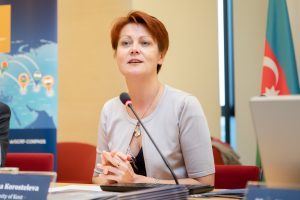 The EIIR is a Policy institute based and registered in Brussels and Paris, producing knowledge and opinions on the effects of politics, economy, international law, human rights on Europe as well as on international relations. The Institute is independent, owing no allegiance to any governments or any political or other organisations. The EIIR stresses rigorous strategic research with a forward-looking policy orientation and places particular emphasis on bringing new perspectives to legal strategic discussions and their framing of socio-political consequences across Europe and beyond.
The EIIR is a Policy institute based and registered in Brussels and Paris, producing knowledge and opinions on the effects of politics, economy, international law, human rights on Europe as well as on international relations. The Institute is independent, owing no allegiance to any governments or any political or other organisations. The EIIR stresses rigorous strategic research with a forward-looking policy orientation and places particular emphasis on bringing new perspectives to legal strategic discussions and their framing of socio-political consequences across Europe and beyond.
International Tartu Conference, 7th-8th June 2021
On 7 June 2021, the COMPASS project opened the 1st day of the 5th International Tartu Conference, with two panels.
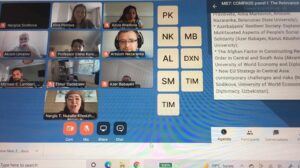 Panel 1 was premised on a Special Issue ‘The Making of Resilient Communities in Central Eurasia’ currently under review with Cambridge Review of International Affairs and included presentations from Timur Dadabaev (Tsukuba University, Japan), Nargis Nurulla-Khodjaeva (MGU, Russia), Artsiom Nazaranka (BSU, Belarus), Azer Babayev (ADA University, Azerbaijan), Akram Umarov and Nargiza Sodikova (UWED, Uzbekistan) to discuss the salience of ‘the local’ in rethinking theory, the human community, security and order across Central Eurasian locality.
Panel 1 was premised on a Special Issue ‘The Making of Resilient Communities in Central Eurasia’ currently under review with Cambridge Review of International Affairs and included presentations from Timur Dadabaev (Tsukuba University, Japan), Nargis Nurulla-Khodjaeva (MGU, Russia), Artsiom Nazaranka (BSU, Belarus), Azer Babayev (ADA University, Azerbaijan), Akram Umarov and Nargiza Sodikova (UWED, Uzbekistan) to discuss the salience of ‘the local’ in rethinking theory, the human community, security and order across Central Eurasian locality.
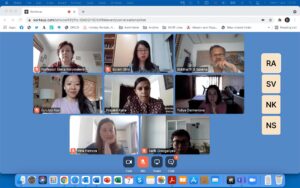 Panel 2 was based on a Special Issue ‘Are we fragile? Eurasian Perspectives’currently under review with the Journal of Eurasian Studies, and included presentations from Yulia Darmenova (Karaganda University, Kazakhstan) /Eunjoo Koo (McGill, Canada), Irina Petrova/Elena Korosteleva (Kent UK), Boram Shin (Jeonbuk University, South Korea), Serik Orazagaliev (Nazarbayev University, Kazakhstan), Prajakti Kalra/Siddharth Saxena (Cambridge UK) to focus on understanding fragilities in a post-neoliberal context. For more information please see the programme or refer to the conference website here. The 1st International Tartu Conference was launched by the UPTAKE project, which the University of Kent was part of.
Panel 2 was based on a Special Issue ‘Are we fragile? Eurasian Perspectives’currently under review with the Journal of Eurasian Studies, and included presentations from Yulia Darmenova (Karaganda University, Kazakhstan) /Eunjoo Koo (McGill, Canada), Irina Petrova/Elena Korosteleva (Kent UK), Boram Shin (Jeonbuk University, South Korea), Serik Orazagaliev (Nazarbayev University, Kazakhstan), Prajakti Kalra/Siddharth Saxena (Cambridge UK) to focus on understanding fragilities in a post-neoliberal context. For more information please see the programme or refer to the conference website here. The 1st International Tartu Conference was launched by the UPTAKE project, which the University of Kent was part of.
COMPASS ADA University Signature Conference 16-17 June 2021 (local time; UTC/GMT+4)
Connecting the 3 Bs: Brussels, Baku, Beijing
The EU/UK & China cooperation initiatives for greater connectivity of Eurasia: the role of Azerbaijan
The GCRF COMPASS Signature Conference at ADA University in Baku will bring together policy-makers, practitioners, business, and academics to discuss existing regional powers’ strategic priorities, instruments and practices in regional connectivity for mutual benefit. The programme is now available: Conference Programme.
GCRF COMPASS UWED Workshop ‘NATO’s withdrawal from Afghanistan: implications for Central Asia’
On 27 May 2021, the GCRF COMPASS led by the UWED team, together with the Embassy of Uzbekistan in the UK, organised a workshop titled ‘NATO’s withdrawal from Afghanistan: implications for Central Asia’. The workshop had a closed format, under the Chatham House rule, and involved a number of prominent speakers from the UK, Uzbekistan and Afghanistan itself.
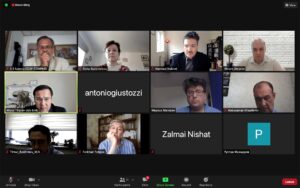 The issues discussed included 1) troops’ withdrawal – the implications; 2) prospects of continued US presence in the region; 3) future of peace talks; and 4) the role of regional countries. The speakers highlighted the ‘wicked’ nature of a problem that the country and the region face – whereby ‘both foreseen and unintended consequences of staying and leaving’ are significant – including continued fragmentation and power vacuum for the united national government; and limited local ownership in terms of local, bottom-up capacity-building – there is a glaring gap and dis-joining between local communities and national government, which hampers the effort of reform and future sustainability. For more information see here.
The issues discussed included 1) troops’ withdrawal – the implications; 2) prospects of continued US presence in the region; 3) future of peace talks; and 4) the role of regional countries. The speakers highlighted the ‘wicked’ nature of a problem that the country and the region face – whereby ‘both foreseen and unintended consequences of staying and leaving’ are significant – including continued fragmentation and power vacuum for the united national government; and limited local ownership in terms of local, bottom-up capacity-building – there is a glaring gap and dis-joining between local communities and national government, which hampers the effort of reform and future sustainability. For more information see here.
“Ensuring food security in the countries of Central Asia: modern realities and challenges in the post-pandemic world” UWED and Central Asian Studies Society Panel, 24 May 2021
The panel was conducted jointly by the University of World Economy and Diplomacy (https://uwed.uz/en/) and Central Eurasian Studies Society (https://www.centraleurasia.org/) with an excellent list of speakers mainly from Central Asia. Please see the full programme for details. The event recording is available here.
‘Achieving SDGs in Central Asia in the wake of COVID-19: Opportunities and threats’ – UWED and GCRF COMPASS Conference, 21st May 2021
The UWED team, together with the COMPASS project partners, the Senate of the Uzbek Parliament and UNDP, organised a conference on ‘Achieving SDGs in Central Asia in the wake of COVID-19: Opportunities and threats’. The online conference hosted over 100 participants, and included a welcoming word from His Excellency Sodyk Safoev, First Deputy Chairman of the Senate of the Oliy Majlis, Mr Komiljon Karimov, Rector of UWED, Ms Matilda Dimowska, UNDP Representative in Uzbekistan, Prof. Elena Korosteleva, PI COMPASS, and Dr Siddharth Saxena, COI COMPASS. The conference discussed many issues relating to the implementation of SDGs and international aid, and involved members of COMPASS – Dr Ulugbeck Khasanov, Prof. Victor Shadurski (Belarus), Dr Faizullo Barotzoda (TNU), Prof. Roza Turarbekova (BSU), Prof. Munira Shahidi (TNU), Fariz Ismailzade (ADA) – and its Advisory Board members – Lord Teverson (House of Lords UK); Prof. Fabienne Bossuyt (Ghent), and Prof. Nargis Nurulla-khodjaeva (MGU). The conference agenda is available here.
Dr Gerald Mako, Cambridge Central Asia Forum, Jesus College, University of Cambridge: ‘Illiberal Saviours: Alexei Navalny and Russia’s Millenia Old Siege Mentality’ on 21 May in the GCRF Cambridge Seminar Series.
Abstract: Portrayals of Alexei Navalny, the most well-known leader of the Russian opposition, tend to paint a black and white picture of him. In what can be broadly described as ‘Western’ media he is a champion of democracy who wages a crusade against Vladimir Putin’s corrupt-to-the-core regime while much of the Russian (and friendly) media is keen to prove that Navalny is an agent provocateur whose main goal is to spread chaos.
 The talk will attempt to shed light on the evolution of Alexei Navalny’s views, their relation to the various contemporary intellectual/political streams in Russia while also discussing the deep historical roots of his views. More information is on our Research Workshops page here.
The talk will attempt to shed light on the evolution of Alexei Navalny’s views, their relation to the various contemporary intellectual/political streams in Russia while also discussing the deep historical roots of his views. More information is on our Research Workshops page here.
20 May 2021 – ‘The ‘good life’ as an alternative to neo-liberal governance: proposing a post-development approach to EU resilience governance in Central Asia’– Prof. Fabienne Bossuyt
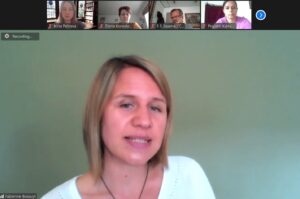 On 20 May 2021 the University of Kent team hosted WiPS webinar with Prof. Fabienne Bossuyt (Ghent University). Prof. Bossuyt presentsed her draft paper ‘The ‘good life’ as an alternative to neo-liberal governance: proposing a post-development approach to EU resilience governance in Central Asia’. Drawing on post-development thinking, the paper further advances the scholarship that critically engages with the European Union (EU)’s approach to resilience as part of the EU’s external governance policy. It argues that if the EU is serious about promoting resilience as a way to empower ‘the local’ and contribute towards a truly sustainable future for the societies of the Central Asian countries, then the EU will need to embrace a de-centered, post-neoliberal approach to resilience.
On 20 May 2021 the University of Kent team hosted WiPS webinar with Prof. Fabienne Bossuyt (Ghent University). Prof. Bossuyt presentsed her draft paper ‘The ‘good life’ as an alternative to neo-liberal governance: proposing a post-development approach to EU resilience governance in Central Asia’. Drawing on post-development thinking, the paper further advances the scholarship that critically engages with the European Union (EU)’s approach to resilience as part of the EU’s external governance policy. It argues that if the EU is serious about promoting resilience as a way to empower ‘the local’ and contribute towards a truly sustainable future for the societies of the Central Asian countries, then the EU will need to embrace a de-centered, post-neoliberal approach to resilience.
Mongolian revolution of 1921 through the prism of 1989: the politics of “historical and cultural heritage” in socialist and post-socialist Mongolia’
On 19 May, Dr Saxena and Prajakti Kalra attended a talk organised by Mongolei-Colloquium with Dr. Irina Morozova (Lehrstuhl für Geschichte Südost- und Osteuropas, Universität Regensburg) on ‘Mongolian revolution of 1921 through the prism of 1989: the politics of “historical and cultural heritage” in socialist and post-socialist Mongolia’. More information is on our Research Workshops page here.
International conference on the impact of the COVID-19 pandemic on the Sustainable Development Goals in Central Asia
The University of World Economy and Diplomacy in partnership with the Senate of the Oliy Majlis of the Republic of Uzbekistan, GCRF COMPASS international project and UNDP representative office in Uzbekistan hosted an international scientific and practical conference on the topic: “Achieving the Sustainable Development Goals in Central Asia in the wake of COVID-19: opportunities and threats.”
It was attended by members of the Senate of the Oliy Majlis, representatives of ministries and departments of the country, experts of the UN and other international organizations, scientists and researchers from Central Asian countries, foreign universities and research institutes, as well as faculty members, senior researchers-applicants of the UWED.
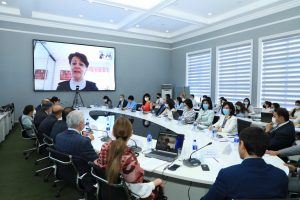 At the opening of the international conference First Deputy Chairman of the Senate of the Oliy Majlis Sodik Safoev, Rector of the University of World Economy and Diplomacy Komiljon Karimov, UNDP Resident Representative in Uzbekistan Matilda Dimovska, Principal Investigator of the GCRF COMPASS project Professor Elena Korosteleva (University of Kent, UK), Co-Investigator of the GCRF COMPASS project Professor Siddhart (Montu) Saxena (University of Cambridge, UK) shared their vision on the ongoing global challenges provoked by pandemic, existing difficulties in the implementation of SDGs and perspectives of their achievement in the new realities. The recording of the event is available here and a full report on the conference is available here.
At the opening of the international conference First Deputy Chairman of the Senate of the Oliy Majlis Sodik Safoev, Rector of the University of World Economy and Diplomacy Komiljon Karimov, UNDP Resident Representative in Uzbekistan Matilda Dimovska, Principal Investigator of the GCRF COMPASS project Professor Elena Korosteleva (University of Kent, UK), Co-Investigator of the GCRF COMPASS project Professor Siddhart (Montu) Saxena (University of Cambridge, UK) shared their vision on the ongoing global challenges provoked by pandemic, existing difficulties in the implementation of SDGs and perspectives of their achievement in the new realities. The recording of the event is available here and a full report on the conference is available here.
New study by ADA SPIA Faculty members analyzes remittances and poverty relationship
ADA University`s SPIA faculty members Dr. Sarvar Gurbanov and PhDc. Vusal Mammadrzayev together with 2019 alumnus of the MPA program Mr. Hasan Isgandar have co-authored a book chapter published by Springer Nature. Hasan is now a Teaching Assistant at the University of Central Florida`s College of Community Innovation and Education.
Short brief about the study: The Coronavirus pandemic wiped out the long success in the global poverty reduction. If a person is living with less than 700 USD a year, then this individual suffers from extreme poverty. Famous scholars studied remittances, calling them “Dollars wrapped with care”. In our study, we proved that there is a strong relationship between remittances and extreme poverty in the following countries: Armenia, Georgia, Kyrgyz Republic, Moldova, Ukraine, and Tajikistan. The World Bank estimates that the cumulative number of people living in extreme poverty globally may increase from 615 to 729 million due to negative impacts stemming from Covid – 19. Putting it differently, the coronavirus pandemic put an end to a two-decade long steady decline in global extreme poverty. In this manner, it is very important to see the relationship between remittances and poverty. Our study entitled “Remittances, Poverty Reduction and Inclusive Growth in the Resource-Poor Former Soviet Union Countries” in Poverty Reduction for Inclusive Sustainable Growth in Developing Asia. (Springer)
‘Korea-Eurasia ST&I Cooperation: Lessons and Prospects’: Cambridge talk by Dr Gill Won Suh
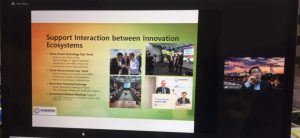 On 14 May, GCRF COMPASS Cambridge hosted Dr Gill Won Suh, Korea Russia Science and Technology Cooperation Center, South Korea, to give a talk on ‘Korea-Eurasia ST&I Cooperation: Lessons and Prospects’. Dr Suh gave a brief history of Korea-Eurasia relationships in the field of science and technology exchanges. More information is on our Research Workshops page here.
On 14 May, GCRF COMPASS Cambridge hosted Dr Gill Won Suh, Korea Russia Science and Technology Cooperation Center, South Korea, to give a talk on ‘Korea-Eurasia ST&I Cooperation: Lessons and Prospects’. Dr Suh gave a brief history of Korea-Eurasia relationships in the field of science and technology exchanges. More information is on our Research Workshops page here.
13 May 2021 – ‘The Dynamics of Reciprocity and Networks of the Kyrgyz through Toi-making: The Case of Bishkek’– Prof. Cholpon Turdalieva
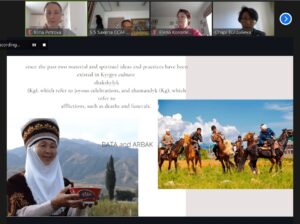 On 13 May 2021 the University of Kent held the WiPS session with Prof. Cholpon Turdalieva (American University of Central Asia, Kyrgyzstan) titled ‘The Dynamics of Reciprocity and Networks of the Kyrgyz through Toi-making: The Case of Bishkek’. Prof. Turdalieva argued that important life-cycle events in Kyrgyz society are marked by the staging of large informal feasting celebrations, known collectively as toi. Recognizing the broader social significance of such celebrations beyond the basic observance of life-cycle events, scholars have analyzed the ‘toi economy’ (Rubinov 2010) highlighting the importance of economic exchanges that occur around toi. Expanding Rubinov’s analysis of the toi economy, this seminar discussed continuity and change in the materiality and symbolism of toi making specifically in an urban context, in Bishkek the capital city of Kyrgyzstan.
On 13 May 2021 the University of Kent held the WiPS session with Prof. Cholpon Turdalieva (American University of Central Asia, Kyrgyzstan) titled ‘The Dynamics of Reciprocity and Networks of the Kyrgyz through Toi-making: The Case of Bishkek’. Prof. Turdalieva argued that important life-cycle events in Kyrgyz society are marked by the staging of large informal feasting celebrations, known collectively as toi. Recognizing the broader social significance of such celebrations beyond the basic observance of life-cycle events, scholars have analyzed the ‘toi economy’ (Rubinov 2010) highlighting the importance of economic exchanges that occur around toi. Expanding Rubinov’s analysis of the toi economy, this seminar discussed continuity and change in the materiality and symbolism of toi making specifically in an urban context, in Bishkek the capital city of Kyrgyzstan.
Globalisation and Order – Insights from the Middle Ages and Early Modern World: Centre for Geopolitics, University of Cambridge Panel on 12 May 2021
Prajakti Kalra gave a talk for the Centre for Geopolitics, University of Cambridge on 12 May 2021 on ‘Globalisation 2.0: Mongol Eurasia to Modern Eurasia (EAEU and BRI). The seminar series is aimed at providing historically-grounded solutions to enduring geopolitical problems. More information is on our Research Workshops page here. A recording of the talk can be found here.
Webinar ‘Belarus at a Crossroads: Lessons Learned on Social and Political Change’
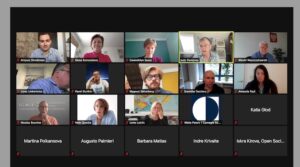 On 11 May 2021 Prof. Korosteleva and Dr Petrova participated in a closed webinar ‘Belarus at a Crossroads: Lessons Learned on Social and Political Change’ organised by Carnegie Europe. The speakers included Prof. Gwen Sasse, Director ZOIS, who presented a December 2020 survey on Belarus, and Artsiom Shraibman, Belarus’ political analyst, who talked about the EU measures to support change in the country – moderated by Judy Dempsey, Carnegie. The event involved politicians, analysts and academics.
On 11 May 2021 Prof. Korosteleva and Dr Petrova participated in a closed webinar ‘Belarus at a Crossroads: Lessons Learned on Social and Political Change’ organised by Carnegie Europe. The speakers included Prof. Gwen Sasse, Director ZOIS, who presented a December 2020 survey on Belarus, and Artsiom Shraibman, Belarus’ political analyst, who talked about the EU measures to support change in the country – moderated by Judy Dempsey, Carnegie. The event involved politicians, analysts and academics.
Webinar ‘Society and Revolution: Social Structure and Prospects of the Protest Movement in Belarus’, 6 May 2021
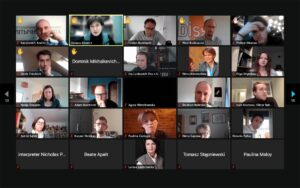 On 6 May 2021 Prof. Elena Korosteleva participated in a webinar ‘Society and Revolution: social Structure and prospects of the protest movement in Belarus’, organised by DRA German-Russian Exchange under the project ‘Network for Belarus’. The discussion focused on the role and levels of mobilisation of different categories of population in the country (especially its gender-dimension), and the sustainability of protests in light of the increasing state repression.
On 6 May 2021 Prof. Elena Korosteleva participated in a webinar ‘Society and Revolution: social Structure and prospects of the protest movement in Belarus’, organised by DRA German-Russian Exchange under the project ‘Network for Belarus’. The discussion focused on the role and levels of mobilisation of different categories of population in the country (especially its gender-dimension), and the sustainability of protests in light of the increasing state repression.
Panel Discussion on ‘Kazakhstan and Environmental Policy’, 6 May 2021
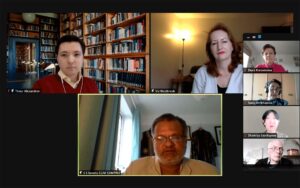 On 6 May 2021 GCRF COMPASS project, in cooperation with Cambridge Central Asia Forum and the Centre of Development Studies, University of Cambridge, and KIMEP University, Kazakhstan organised a Panel Discussion on ‘Kazakhstan and Environmental Policy’, chaired by Prof. Vivienne Westbrook (KIMEP University) and Dr Siddharth Saxena (Cambridge); and moderated by Dr Timur Alexandrov (Cambridge).
On 6 May 2021 GCRF COMPASS project, in cooperation with Cambridge Central Asia Forum and the Centre of Development Studies, University of Cambridge, and KIMEP University, Kazakhstan organised a Panel Discussion on ‘Kazakhstan and Environmental Policy’, chaired by Prof. Vivienne Westbrook (KIMEP University) and Dr Siddharth Saxena (Cambridge); and moderated by Dr Timur Alexandrov (Cambridge). 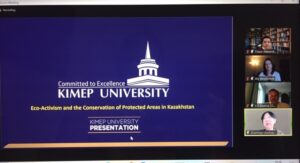
More information is on our Research Workshops page here.
Dr Saxena on the CAREC Advisory Board
Dr Saxena has been invited to join the CAREC Advisory Board. The Central Asia Regional Economic Cooperation (CAREC) Program is a partnership of 11 countries and development partners working together to promote development through cooperation, leading to accelerated economic growth and poverty reduction. It is guided by the overarching vision of “Good Neighbors, Good Partners, and Good Prospects.”
The program is a proactive facilitator of practical, results-based regional projects, and policy initiatives critical to sustainable economic growth and shared prosperity in the region. Since its inception in 2001 and as of December 2020, CAREC has mobilized $39.34 billion in investments that have helped establish multimodal transportation networks, increased energy trade and security, facilitated free movement of people and freight, and laid the groundwork for economic corridor development.
China Centre, Jesus College Seminar Series March-May 2021
Dr Saxena and Prajakti Kalra attended the following talks chaired by Professor Peter Nolan (AB member, GCRF COMPASS)
- 25 May Panel Discussion on ‘The future of Hong Kong’ with Professor Ian Grenville Cross SC, Isabel Hilton OBE, Ronny Tong SC and Professor David Zweig.
- 20 May Professor Huaichuan Ru, ‘The history of China’s high-speed trains’
- 13 May David Lane, ‘Whither Socialism with Chinese Characteristics’
- 19 March ‘China re-connects: joining a deep-rooted past to a new world order’
- 3 March Sir David King, ‘A fresh look at climate change: climate risks and COP26’
Webinar ‘Central Asia at 30: The Long Road to Reform’, Chatham House, 27 April 2021
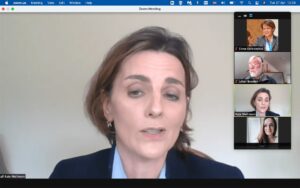 On 27 April 2021, Professor Elena Korosteleva and Dr Irina Petrova participated in a webinar ‘Central Asia at 30: the long road to reform’ organised by Chatham House. The webinar explored the state of play in Central Asia, thirty years after the collapse of the Soviet Union. Participants included Aziza Umarova, CEO SmartGov Consulting; Julian Bowden, Oxford Institute for Energy Studies and Kassymkhan Kapparov, Founder Ekomist.kz, moderated by Kate Mallinson, Russia and Eurasia Programme, Chatham House. All speakers noted a gradual rise of the region, especially economically and in global connectivity. However, the challenges ahead include countries’ dependency on their undiversified supply sector, which could lead to a deficit in the future, consequences of COVID-19 and rising presence of China in the region, which could become a proxy of the latter.
On 27 April 2021, Professor Elena Korosteleva and Dr Irina Petrova participated in a webinar ‘Central Asia at 30: the long road to reform’ organised by Chatham House. The webinar explored the state of play in Central Asia, thirty years after the collapse of the Soviet Union. Participants included Aziza Umarova, CEO SmartGov Consulting; Julian Bowden, Oxford Institute for Energy Studies and Kassymkhan Kapparov, Founder Ekomist.kz, moderated by Kate Mallinson, Russia and Eurasia Programme, Chatham House. All speakers noted a gradual rise of the region, especially economically and in global connectivity. However, the challenges ahead include countries’ dependency on their undiversified supply sector, which could lead to a deficit in the future, consequences of COVID-19 and rising presence of China in the region, which could become a proxy of the latter.
GCRF COMPASS, Cambridge Central Asia Forum and Centre for Development Studies – Novruz talk by Professor Ambassador Hasan Hasanov of Azerbaijan
On 23 April 2021, GCRF COMPASS together with the Centre for Development Studies and Cambridge Central Asia Forum, Jesus College hosted Professor Ambassador Hasan Hasanov of Azerbaijan, who spoke about the historic traditions of Novruz, and its salience for the wider Eurasian region.
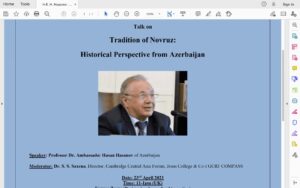
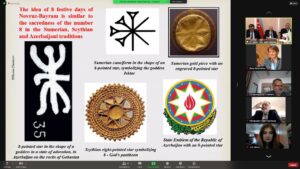
Participants learned about the origin, the rituals, traditions and the meaning of Novruz, and how it drew people together from wider neighbourhoods to celebrate the beginning of life and spring. More information is on our Research Workshops page here.
22 April 2021 – ‘Internal Aspects of Stability in Central Asia: Regional Integration and Disintegration’’– Dr Farrukh Salimov
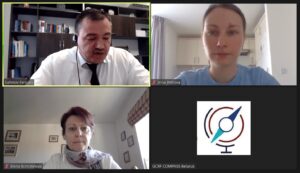 On 22 April 2021 the University of Kent held the WiPS session with Dr Farrukh Salimov (Tajik National University). Dr Salimov argued that Central Asia becomes one of the key sub-regions of Central Eurasia, actively participating in a number of international cooperation and integration projects. Regional stability remains one of the cornerstone factors for sustainable development of the region. This presentation addressed the factors of internal aspects of regional stability in Central Asia, with a particular focus on Tajikistan. It discussed some of the major trends in the local socio-economic development, and internal and external challenges to stability. Integration and disintegration processes, reasons behind them and potential risks were assessed. The presentation also highlighted potential scenarios for future of regional integration in view of wider regional stability of Central Asia. The recording will be available on the website shortly.
On 22 April 2021 the University of Kent held the WiPS session with Dr Farrukh Salimov (Tajik National University). Dr Salimov argued that Central Asia becomes one of the key sub-regions of Central Eurasia, actively participating in a number of international cooperation and integration projects. Regional stability remains one of the cornerstone factors for sustainable development of the region. This presentation addressed the factors of internal aspects of regional stability in Central Asia, with a particular focus on Tajikistan. It discussed some of the major trends in the local socio-economic development, and internal and external challenges to stability. Integration and disintegration processes, reasons behind them and potential risks were assessed. The presentation also highlighted potential scenarios for future of regional integration in view of wider regional stability of Central Asia. The recording will be available on the website shortly.
Info Session ‘Dealing with Rejection and Recycling your Proposal’, 20 April 2021
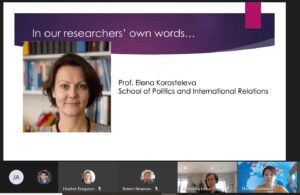 On 20 April Prof. Elena Korosteleva was invited to speak about her funding experience to the colleagues within the Division for Humanities and Social Sciences, of the University of Kent. In particular, she highlighted that success is a relative thing, and sometime, failure and rejection by funders is a useful opportunity to learn from. What matters the most are i) your idea; 2) your team whom you can rely on entirely; and 3) your working closely with professional support team, to ensure success. The slides of the session are available here.
On 20 April Prof. Elena Korosteleva was invited to speak about her funding experience to the colleagues within the Division for Humanities and Social Sciences, of the University of Kent. In particular, she highlighted that success is a relative thing, and sometime, failure and rejection by funders is a useful opportunity to learn from. What matters the most are i) your idea; 2) your team whom you can rely on entirely; and 3) your working closely with professional support team, to ensure success. The slides of the session are available here.
Save the Date: 20 April 2021 – IX International Round Table on Innovation in International Research “Eurasian Economic Union and Shanghai Cooperation Organization: on the path of mutually beneficial cooperation”
20 April 2021 – IX International Round Table on Innovation in International Research “Eurasian Economic Union and Shanghai Cooperation Organization: on the path of mutually beneficial cooperation” will be organized at the BSU with the support of the GCRF COMPASS. Online and offline participation possible. More information is available here.
ADA International Conference – Vision for South Caucasus: Post-Conflict Development and Cooperation
A three-day long international conference “New Vision for South Caucasus: Post-Conflict Development and Cooperation” was organized by ADA University on 10-13 April 2021. 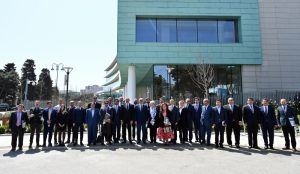 As part of the conference there was a visit of heads of foreign think tanks and international experts to Azerbaijan. Highlights of the conference included a forum to discuss issues of the future of the South Caucasus region, reintegration and recovery processes; a trip to the liberated Aghdam region where participants witnessed the destruction of Aghdam city, occupied by the Armenian forces for almost 30 years; and a speech by President of the Republic of Azerbaijan, Mr. Ilham Aliyev, on military operations during the 44-day war, the victory of Azerbaijan and the ongoing political processes in the region after the war.
As part of the conference there was a visit of heads of foreign think tanks and international experts to Azerbaijan. Highlights of the conference included a forum to discuss issues of the future of the South Caucasus region, reintegration and recovery processes; a trip to the liberated Aghdam region where participants witnessed the destruction of Aghdam city, occupied by the Armenian forces for almost 30 years; and a speech by President of the Republic of Azerbaijan, Mr. Ilham Aliyev, on military operations during the 44-day war, the victory of Azerbaijan and the ongoing political processes in the region after the war.
The 4th International Workshop “Science in Diplomacy and Diplomacy in Science” was held on 8-9 April
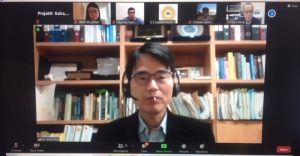 This workshop was the fourth meeting of the Korean government funded programme: Global Research Network with Jeonbuk National University (Korea), University of Cambridge, Plekhanov Russian National University of Economics and Eurasian Research Institute.
This workshop was the fourth meeting of the Korean government funded programme: Global Research Network with Jeonbuk National University (Korea), University of Cambridge, Plekhanov Russian National University of Economics and Eurasian Research Institute.
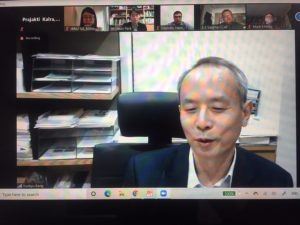 The workshop invited senior scientists and policy makers from Korea along with academics and scientists from Uzbekistan, Kazakhstan, Russia and the UK to discuss prospects and challenges of scientific research and how basic science can be the cornerstone of diplomacy.
The workshop invited senior scientists and policy makers from Korea along with academics and scientists from Uzbekistan, Kazakhstan, Russia and the UK to discuss prospects and challenges of scientific research and how basic science can be the cornerstone of diplomacy.
COMPASS at the International Studies Association (ISA) Annual Convention 2021
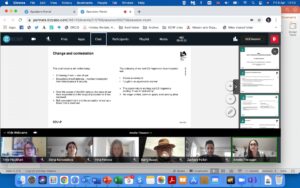 On 6-9 April 2021 Prof. Elena Korosteleva, Dr Irina Petrova and Dr Muzaffer Kutlay took part in the International Studies Association Annual Convention. Dr Kutlay’s presentation was based on her doctoral dissertation and focused on the politics of ethno-centric nationalism. Prof. Korosteleva and Dr Irina Petrova presented a paper on resilience in global international society, prepared as a chapter in the edited volume by Prof. Trine Flockhart (University of Southern Denmark) and Dr Zach Paikin (CEPS) ‘Rebooting International Global Society: Change, Contestation and Resilience’ expected to be published by Palgrave Macmillan in 2022.
On 6-9 April 2021 Prof. Elena Korosteleva, Dr Irina Petrova and Dr Muzaffer Kutlay took part in the International Studies Association Annual Convention. Dr Kutlay’s presentation was based on her doctoral dissertation and focused on the politics of ethno-centric nationalism. Prof. Korosteleva and Dr Irina Petrova presented a paper on resilience in global international society, prepared as a chapter in the edited volume by Prof. Trine Flockhart (University of Southern Denmark) and Dr Zach Paikin (CEPS) ‘Rebooting International Global Society: Change, Contestation and Resilience’ expected to be published by Palgrave Macmillan in 2022.
Webinar ‘The State of Civil Society in Central Asia: Kazakhstan’, 29 March 2021
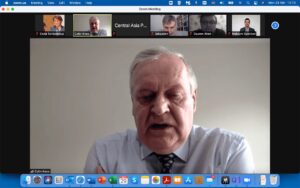 On 29 March Prof. Elena Korosteleva and Dr Irina Petrova attended the webinar ‘The State of Civil Society in Central Asia: Kazakhstan’. Organised by the George Washington University Central Asia Programme, the webinar featured Colin Knox, Dauren Aben and Maksym Sytnikov who spoke about the civil society landscape in Kazakhstan. The session addressed broader developmental trends and civil society challenges in Kazakhstan, recent developments and legislative changes and Kazakhstani civil society’s expectations of Western supporters.
On 29 March Prof. Elena Korosteleva and Dr Irina Petrova attended the webinar ‘The State of Civil Society in Central Asia: Kazakhstan’. Organised by the George Washington University Central Asia Programme, the webinar featured Colin Knox, Dauren Aben and Maksym Sytnikov who spoke about the civil society landscape in Kazakhstan. The session addressed broader developmental trends and civil society challenges in Kazakhstan, recent developments and legislative changes and Kazakhstani civil society’s expectations of Western supporters.
Public commitments: working with talented school graduates
Belarus COMPASS NTL Artsiom Nazaranka served as a Jury member for the Belarus National Competition in History for School graduates, held in Zlobin (Gomel oblast) in March 29 – April 2, 2021. National competitions (respublikanskaja olimpiada) in different subjects are held yearly by the Belarus Ministry of Education and are aimed at selecting and supporting the most talented and motivated young people.
Fabienne Bossuyt interview to the National Television and Radio Company of Uzbekistan
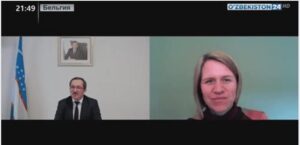 COMPASS Advisory Board member Prof. Fabienne Bossuyt gave an interview to the National Television and Radio Company of Uzbekistan (O’zMTRK O’zbekiston milliy teleradiokompaniyasi) on 26 March 2021. The interview was devoted to Prof. Bossuyt’s study of mahallas and how the EU should engage with them. The full version can be viewed here.
COMPASS Advisory Board member Prof. Fabienne Bossuyt gave an interview to the National Television and Radio Company of Uzbekistan (O’zMTRK O’zbekiston milliy teleradiokompaniyasi) on 26 March 2021. The interview was devoted to Prof. Bossuyt’s study of mahallas and how the EU should engage with them. The full version can be viewed here.
Training programme “Management of international projects in higher education institutions”, 22–26 March, 2021
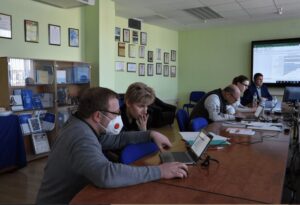 A new edition of the training programme for university professionals was implemented at the BSU. Training was organized in blended mode – with people being physically in the classroom but also joining programme via online-tools. The training programme was organized at the initiative of the BSU Department of International Relations. Belarus COMPASS NTL Artsiom Nazaranka ran training in project development.
A new edition of the training programme for university professionals was implemented at the BSU. Training was organized in blended mode – with people being physically in the classroom but also joining programme via online-tools. The training programme was organized at the initiative of the BSU Department of International Relations. Belarus COMPASS NTL Artsiom Nazaranka ran training in project development.
International Scientific Conference “Alien species of animals, fungi and plants in Belarus and neighbouring countries” was held in the BSU, 23 March 2021
The conference gathered researchers from Belarus and neighbouring countries to discuss current environmental problems and explore further opportunities for cross-border regional cooperation in research and development domains. The conference supported by the GCRF COMPASS was organized by the Belarusian State University in cooperation with State Research and Production Association “Scientific Research Center of the National Academy of Sciences of Belarus for Bioresources”, A.N. Severtsov Institute of Ecology and Evolution of the Russian Academy of Sciences.
Proceedings are to be published in the current academic year 2020/2021, several submissions made to the Russian Journal of Biological Invasions.
Annual Navroz (Spring Festival) Celebrations, 19 March
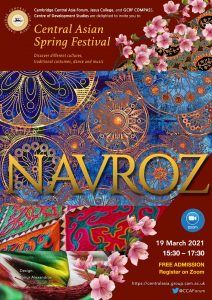 Cambridge Central Asia Forum in collaboration with GCRF COMPASS and the Centre of Development Studies organised annual Navroz (Spring Festival) celebration on 19 March 2021.
Cambridge Central Asia Forum in collaboration with GCRF COMPASS and the Centre of Development Studies organised annual Navroz (Spring Festival) celebration on 19 March 2021.
Navroz (New day) transcends religious, ethnic, linguistic, and national divisions and brings people together. It showcases the region’s rich tradition and mythology, a once in a lifetime experience. Above all else, it is an occasion for celebration. The event was joined by more than 130 people, including Prof. Lord Mair, Ambassador of Afghanistan HE Zalmai Rassoul, HE Tahir Taghizadeh of Azerbaijan, HE Edil Baisalov of Kyrgyz Republic, HE Masud Khalifazoda of Tajikistan, HE Yazmurad Seryaev of Turkmenistan, HE Said Rustamov of Uzbekistan. This year the Navroz programme was virtual, the recording is available here.
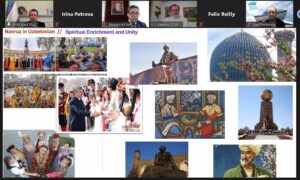
International Academic conference “The Riga Peace Treaty of 1921 in Destinies of the Peoples of Eastern and Central Europe” was held in the BSU, Minsk, 18 March 2021
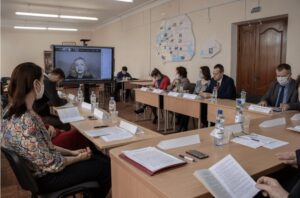 International academic conference The Riga Peace Treaty of 1921 in Destinies of the Peoples of Eastern and Central Europe” dedicated to the 100th anniversary of conclusion of the Treaty, was held on March 4, 2021 at the BSU (Minsk).
International academic conference The Riga Peace Treaty of 1921 in Destinies of the Peoples of Eastern and Central Europe” dedicated to the 100th anniversary of conclusion of the Treaty, was held on March 4, 2021 at the BSU (Minsk).
About 60 researchers from Belarus, Poland and Russia presented and discussed their research during plenary and three thematic panels dedicated to the Riga peace treaty and European diplomacy in 1918-1921; social, economic and political processes in Central and Eastern Europe in the late XIX – early XX century and in 1921–1941.
The conference was organized by the BSU Faculty of History with the support of the GCRF COMPASS.
Conference proceedings are expected in the mid 2021. The programme is available here.
18 March 2021 – ‘The Nationhood through Neighbourhood? Post-coloniality and Emerging Features of Central Asian International Relations’ – Prof. Timur Dadabaev
 On 18 March 2021 the University of Kent held the WiPS session with Prof. Timur Dadabaev (University of Tsukuba, Japan). Prof. Dadabaev presented his ongoing research on post-coloniality in International Relations, particularly in the Central Asian region. By revisiting the main theoretical assumptions which are widely used to narrate the features of International Relations in Central Asia, the talk demonstrated that the major deficiency of theoretical frames applied to Central Asian (CA) region is that they extensively rely on rationalist arguments along the lines of rivalry, domination, spheres of influence, and the rhetoric of ‘divide and conquer’. This way they miss out the local dynamics of emerging CA regional international relations such as neighbourhood, brotherhood/fraternity and local norms that serve among distinctive features of international relations in Central Asia.
On 18 March 2021 the University of Kent held the WiPS session with Prof. Timur Dadabaev (University of Tsukuba, Japan). Prof. Dadabaev presented his ongoing research on post-coloniality in International Relations, particularly in the Central Asian region. By revisiting the main theoretical assumptions which are widely used to narrate the features of International Relations in Central Asia, the talk demonstrated that the major deficiency of theoretical frames applied to Central Asian (CA) region is that they extensively rely on rationalist arguments along the lines of rivalry, domination, spheres of influence, and the rhetoric of ‘divide and conquer’. This way they miss out the local dynamics of emerging CA regional international relations such as neighbourhood, brotherhood/fraternity and local norms that serve among distinctive features of international relations in Central Asia.
Belarus National Erasmus+ Information Day, 17 March 2021
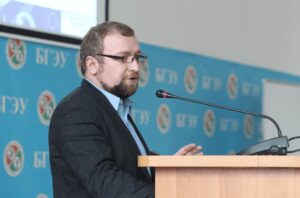 Belarus COMPASS NTL Artsiom Nazaranka was invited to present on the best practices of participation in the Erasmus+ Jean Monnet Programme during Belarus National Erasmus+ Information Day 2021. The event was organized by the Belarus Erasmus+ National Office and held at the Belarusian State University in Minsk. Information Day gathered national experts as well as representative of the EACEA and was attended by over 50 professionals from Belarusian universities.
Belarus COMPASS NTL Artsiom Nazaranka was invited to present on the best practices of participation in the Erasmus+ Jean Monnet Programme during Belarus National Erasmus+ Information Day 2021. The event was organized by the Belarus Erasmus+ National Office and held at the Belarusian State University in Minsk. Information Day gathered national experts as well as representative of the EACEA and was attended by over 50 professionals from Belarusian universities.
New book: ‘Principled Pragmatism in Practice: The EU’s Policy towards Russia after Crimea’ (eds. F. Bossuyt and P. Van Elsuwege, 2021)
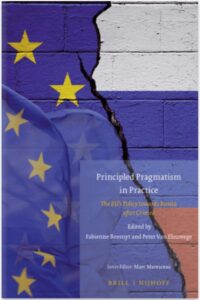 COMPASS Advisory Board member Prof. Fabienne Bossuyt co-edited a new book ‘Principled Pragmatism in Practice: The EU’s Policy towards Russia after Crimea’ (Brill). The book contains chapters by COMPASS PDRA Dr Irina Petrova, Advisory Board member Prof. Tatiana Romanova and project affiliates Dr Igor Merheim-Eyre and Dr Thomas Kruessmann. By taking stock of the implementation of the EU’s Global Strategy and the five principles that are guiding EU-Russia relations, this volume provides a forward-looking angle and contributes to a better understanding of the current EU-Russia relationship and the prospects for overcoming the existing deadlock. The book is available here.
COMPASS Advisory Board member Prof. Fabienne Bossuyt co-edited a new book ‘Principled Pragmatism in Practice: The EU’s Policy towards Russia after Crimea’ (Brill). The book contains chapters by COMPASS PDRA Dr Irina Petrova, Advisory Board member Prof. Tatiana Romanova and project affiliates Dr Igor Merheim-Eyre and Dr Thomas Kruessmann. By taking stock of the implementation of the EU’s Global Strategy and the five principles that are guiding EU-Russia relations, this volume provides a forward-looking angle and contributes to a better understanding of the current EU-Russia relationship and the prospects for overcoming the existing deadlock. The book is available here.
17 March 2021 – ‘Civil Societies Conversations Webinar Series with the Eurasian Civil Society Leaders’ – Mr Kirill Osin
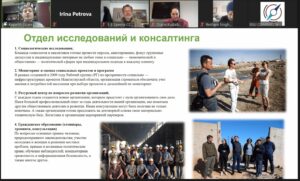 On 17 March 2021, GCRF COMPASS and Cambridge Central Asia Forum, Jesus College, University of Cambridge organised the next talk in the ‘Civil Societies Conversations Webinar Series with the Eurasian Civil Society Leaders’ with Mr Kirill Osin, Director of the “Eco Mangystau” NGO from Aktau, Kazakhstan. Mr Osin presented a range of local civil society initiatives implemented in Aktau, discussed success stories and challenges faced by his organisation and civil society in the region. The recording of the presentation is available here.
On 17 March 2021, GCRF COMPASS and Cambridge Central Asia Forum, Jesus College, University of Cambridge organised the next talk in the ‘Civil Societies Conversations Webinar Series with the Eurasian Civil Society Leaders’ with Mr Kirill Osin, Director of the “Eco Mangystau” NGO from Aktau, Kazakhstan. Mr Osin presented a range of local civil society initiatives implemented in Aktau, discussed success stories and challenges faced by his organisation and civil society in the region. The recording of the presentation is available here.
Integrated Review of Security, Defence, Development and Foreign Policy
On 16 March 2021 Professor Elena Korosteleva received a thank-you letter from the Cabinet Office, for her contribution to the recently published Government Integrated Review.
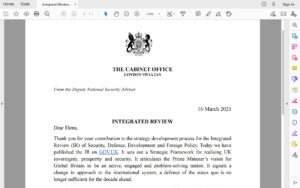
Professor Korosteleva advocated for greater investment in global partnerships (especially across the Global South), a more self-organising approach to understanding resilience and closer cooperation with the grassroots agencies, to facilitate ‘a more integrated, adaptive, and innovative structures and capabilities, reaching beyond central government’ (p. 97). The implementation of this strategy however, will depend on the government’s commitment to follow through their ‘actions rather than words’ (p.14).
Pakistan-Uzbekistan Relations on Positive Trajectory: ECI-CIRS Webinar
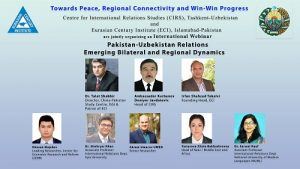
COMPASS UWED team member Dr Akram Umarov took part in ECI-CIRS Webinar ‘Pakistan-Uzbekistan Relations on Positive Trajectory’. Speakers included Amb. Kurbanov Doniyor Javdatovic, head of CIRS, Dr. Talat Shabbir. Director of China Pakistan Study Centre, ISSI; Khasan Majidov, CERR; Dr. Sheharyar Khan, Iqra University; Akram Umarov, senior researcher; Dr. Sarwat Rauf, National University of Modren Languages; Yunusova Zilola Bakhodirovna, CIRS and Irfan Shahzad Takalvi, founding head of ECI.
Webinar participants noted that already built and planned Uzbekistan-Afghanistan-Pakistan connectivity initiatives particularly the railway linkage agreed upon by the three countries would usher the two regions of Central and South Asia into a new era of commercial cooperation and people-to-people contact. This connectivity would help the three partner countries and other players in the region to optimally utilize potential for collaboration in economic, developmental, social and people-to-people spheres.
However, the participants noted, that peace and stability not only in Afghanistan – for which the chances are seemingly brightening – but also on both sides of Pak-Afghan border would be crucial for any lasting connectivity and cooperation between Uzbekistan and Pakistan and between south and central Asia. Further information is available here.
11 March 2021 – ‘Inter-Asia through Inland Eyes: Afghan Trading Networks across Land and Sea’ – Dr Magnus Marsden
 On 11 March 2021, COMPASS Advisory Board Member, Professor Magnus Marsden from the University of Sussex gave an insightful lecture on ‘Inter-Asia through Inland Eyes: Afghan Trading Networks across Land and Sea’. His talk demonstrated the significance of long-distance networks formed by traders from Afghanistan and Central Asia to the forging of present-day transregional connections within Asia. He focused on two specific corridors of connectivity authored by these traders: a ‘Eurasian corridor’ connecting East Asia to post-Soviet Eurasia and extending into Western Europe and a ‘West Asian corridor’ involving traders originally from Central Asia linking East Asia to Turkey and the Arabian Peninsular, thus exposing the ancient connectivity of the region with the world. Magnus Marsden is Professor of Social Anthropology and Director of the Asia Centre at the University of Sussex. He has conducted fieldwork in Muslim Asia, especially Pakistan and Afghanistan for over twenty years. His publications include Living Islam (Cambridge, 2005), Fragments of the Afghan Frontier (Hurst/Oxford, 2012), Trading Worlds (Hurst/Oxford, 2016), and Beyond the Silk Road (Cambridge, 2021).
On 11 March 2021, COMPASS Advisory Board Member, Professor Magnus Marsden from the University of Sussex gave an insightful lecture on ‘Inter-Asia through Inland Eyes: Afghan Trading Networks across Land and Sea’. His talk demonstrated the significance of long-distance networks formed by traders from Afghanistan and Central Asia to the forging of present-day transregional connections within Asia. He focused on two specific corridors of connectivity authored by these traders: a ‘Eurasian corridor’ connecting East Asia to post-Soviet Eurasia and extending into Western Europe and a ‘West Asian corridor’ involving traders originally from Central Asia linking East Asia to Turkey and the Arabian Peninsular, thus exposing the ancient connectivity of the region with the world. Magnus Marsden is Professor of Social Anthropology and Director of the Asia Centre at the University of Sussex. He has conducted fieldwork in Muslim Asia, especially Pakistan and Afghanistan for over twenty years. His publications include Living Islam (Cambridge, 2005), Fragments of the Afghan Frontier (Hurst/Oxford, 2012), Trading Worlds (Hurst/Oxford, 2016), and Beyond the Silk Road (Cambridge, 2021).
11 March 2021 – ‘Is There Room for More Engagement with Muslim Civil Society in Central Asia? Disaggregating Its Multipole Components, Approaches and Goals’ – Dr Emil Nasritdinov
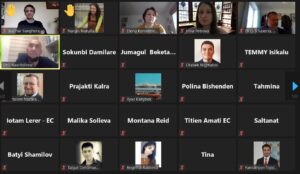 On 11 March 2021 the University of Kent held the WiPS session with Dr Emil Nasritdinov (American University of Central Asia, Kyrgyzstan). Dr Nasritdinov presented preliminary findings of the project on the role of Muslim civil society in Central Asia, co-authored with Dr Sebastien Peyrouse (George Washington University) and supported by the United State Institute for Peace. The presentation focused on six forms of Muslim civil society – Muftiyats, Islamic Foundations, Islamic NGOs, various jamaats, mosques and mahallas – in four countries (Kyrgyzstan, Kazakhstan, Uzbekistan and Tajikistan) and discussed their role for the local communities and international relations.
On 11 March 2021 the University of Kent held the WiPS session with Dr Emil Nasritdinov (American University of Central Asia, Kyrgyzstan). Dr Nasritdinov presented preliminary findings of the project on the role of Muslim civil society in Central Asia, co-authored with Dr Sebastien Peyrouse (George Washington University) and supported by the United State Institute for Peace. The presentation focused on six forms of Muslim civil society – Muftiyats, Islamic Foundations, Islamic NGOs, various jamaats, mosques and mahallas – in four countries (Kyrgyzstan, Kazakhstan, Uzbekistan and Tajikistan) and discussed their role for the local communities and international relations.
Talk by His Excellency Masud Khalifazoda, Ambassador of the Republic of Tajikistan to the UK, 26 February 2021
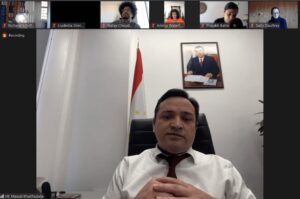 On 26 February 2021, Cambridge Central Asia Forum, GCRF COMPASS and Centre of Development Studies organised a talk by His Excellency Masud Khalifazoda, Ambassador of the Republic of Tajikistan to the UK. The ambassador spoke about the priorities of Tajikistan’s development, the impact of Covid-19 on the country, British-Tajik relations in the aftermath of Brexit and the importance of urgently addressing global challenges. The talk was followed by Q&A session and an extensive discussion. The video of the talk will be available shortly.
On 26 February 2021, Cambridge Central Asia Forum, GCRF COMPASS and Centre of Development Studies organised a talk by His Excellency Masud Khalifazoda, Ambassador of the Republic of Tajikistan to the UK. The ambassador spoke about the priorities of Tajikistan’s development, the impact of Covid-19 on the country, British-Tajik relations in the aftermath of Brexit and the importance of urgently addressing global challenges. The talk was followed by Q&A session and an extensive discussion. The video of the talk will be available shortly.
COMPASS Training School at ADA University, 15-19 February 2021
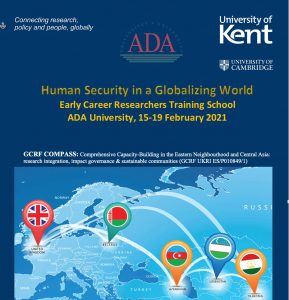 On 15-19 February 2021 ADA University, under the auspices of GCRF COMPASS project, organised an International Training School for the early career researchers. The focus of the School was on Human Security in a Globalising World, involving international speakers such as Prof. Mary Kaldor (LSE IDEAS), Dr Mary Martin (UN Business and Human Security Initiative LSE), Dr Bruno Martins (PRIO Norway), Dr Ingvild Bode (SDU Denmark), Dr Ayca Ergun (METU Turkey) and more. The early career researchers presented their individual work and engaged in skills training sessions. Their papers will be published as part of the GCRF COMPASS proceedings. The programme is available here, further information about the participants can be accessed here.
On 15-19 February 2021 ADA University, under the auspices of GCRF COMPASS project, organised an International Training School for the early career researchers. The focus of the School was on Human Security in a Globalising World, involving international speakers such as Prof. Mary Kaldor (LSE IDEAS), Dr Mary Martin (UN Business and Human Security Initiative LSE), Dr Bruno Martins (PRIO Norway), Dr Ingvild Bode (SDU Denmark), Dr Ayca Ergun (METU Turkey) and more. The early career researchers presented their individual work and engaged in skills training sessions. Their papers will be published as part of the GCRF COMPASS proceedings. The programme is available here, further information about the participants can be accessed here.
18 February 2021 – ‘COVID-19 and its Impact on Azerbaijan: Is the System Resilient Enough?’’ – Dr Anar Valiyev
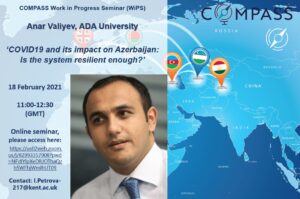 On 28 January 2021 the University of Kent held the WiPS session with Dr Anar Valiyev titled ‘COVID-19 and its impact on Azerbaijan: Is the system resilient enough?’. Anar argued that COVID-19 has significantly impacted socio-economic development of Azerbaijan and the actual impact is yet to be assessed in the years to come, but a number of negative trends in economy, healthcare and education systems can be already documented. The presentation also reflected on the potential implications of COVID-19 on governance institutions and offered a range of policy recommendations for greater resilience.
On 28 January 2021 the University of Kent held the WiPS session with Dr Anar Valiyev titled ‘COVID-19 and its impact on Azerbaijan: Is the system resilient enough?’. Anar argued that COVID-19 has significantly impacted socio-economic development of Azerbaijan and the actual impact is yet to be assessed in the years to come, but a number of negative trends in economy, healthcare and education systems can be already documented. The presentation also reflected on the potential implications of COVID-19 on governance institutions and offered a range of policy recommendations for greater resilience.
Webinar “World on the Edge’: The Crisis of the Western Liberal Order “, 16 February 2021
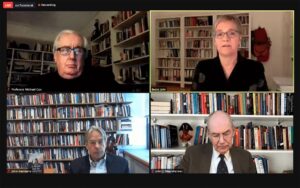 On 16 February 2021, Prof. Elena Korosteleva, Dr Irina Petrova and Ms Prajakti Kalra attended the debate about “The World on the Edge’: the crisis of the western liberal order” organised by Prof. Michael Cox LSE IDEAS, with Profs. John Ikenberry, John J. Mearsheimer, and Beate Jahn, to discuss the nature of crisis and possible solutions to moving forward, especially in the context of current challenges of the pandemic, shrinking economy, detraction of the idea of liberal democracy and fragmenting international society.
On 16 February 2021, Prof. Elena Korosteleva, Dr Irina Petrova and Ms Prajakti Kalra attended the debate about “The World on the Edge’: the crisis of the western liberal order” organised by Prof. Michael Cox LSE IDEAS, with Profs. John Ikenberry, John J. Mearsheimer, and Beate Jahn, to discuss the nature of crisis and possible solutions to moving forward, especially in the context of current challenges of the pandemic, shrinking economy, detraction of the idea of liberal democracy and fragmenting international society.
Talk by Dr. Taleh Ziyadov on ‘Regional Development and Prospects of Cooperation in the Caucasus: Economic Connectivity’, 10 February 2021
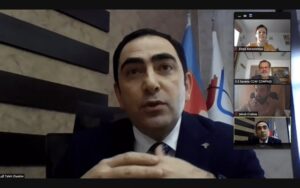 On 10 February 2021, the Cambridge Central Asian Forum, under the auspices of GCRF COMPASS project, has organised a talk by Dr Taleh Ziyadov, on Economic Connectivity in the Caucasus. Dr Ziyadov is Director-General of Baku International Sea Trade Port in Azerbaijan. He spoke about the history of the Silk Roads connecting Azerbaijan with ancient Eurasia, and the current challenges and opportunities presented to the country aiming to become a global hub (and a free zone) for the wider Eurasia connectivity in the future.
On 10 February 2021, the Cambridge Central Asian Forum, under the auspices of GCRF COMPASS project, has organised a talk by Dr Taleh Ziyadov, on Economic Connectivity in the Caucasus. Dr Ziyadov is Director-General of Baku International Sea Trade Port in Azerbaijan. He spoke about the history of the Silk Roads connecting Azerbaijan with ancient Eurasia, and the current challenges and opportunities presented to the country aiming to become a global hub (and a free zone) for the wider Eurasia connectivity in the future.
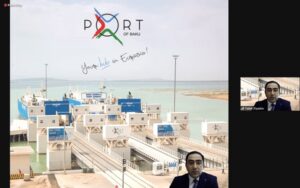
Prof. Elena Korosteleva interviewed by Jon Snow, ITN Channel 4, 8 February 2021
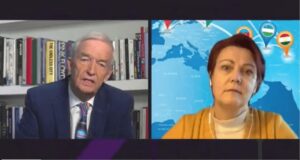 On 8 February 2021, Prof. Elena Korosteleva was interviewed by Jon Snow on a 6pm ITN Channel 4 News to speak about the continued protests in Belarus. Six months on since the fraudulent presidential election of 9 August 2020, the protests have now acquired a new format – more localised, neighbourhood based (supol’nast’), mobilising local people, getting to know the neighbours, and coming together, to make change sustainable and future – more tangible, through resilience-building. Prof. Korosteleva reflected this in her interview, drawing on her work with COMPASS PDRA Dr Petrova about the rise of ‘peoplehood’ in Belarus and wider Eurasia, as part of the GCRF COMPASS project.
On 8 February 2021, Prof. Elena Korosteleva was interviewed by Jon Snow on a 6pm ITN Channel 4 News to speak about the continued protests in Belarus. Six months on since the fraudulent presidential election of 9 August 2020, the protests have now acquired a new format – more localised, neighbourhood based (supol’nast’), mobilising local people, getting to know the neighbours, and coming together, to make change sustainable and future – more tangible, through resilience-building. Prof. Korosteleva reflected this in her interview, drawing on her work with COMPASS PDRA Dr Petrova about the rise of ‘peoplehood’ in Belarus and wider Eurasia, as part of the GCRF COMPASS project.
Talk by Dr Umarov on ‘Central Asia: the construction of a new regional security complex and the role of Afghanistan’, 5 February 2021
On 5 February 2021, the University of Cambridge organised a discussion with Dr Akram Umarov, the COMPASS UWED team member. Dr Umarov argued that the election of the new president in Uzbekistan in 2016 triggered the intensification of Uzbekistan’s foreign policy. Analyzing the recent trends, he put forward the argument of the formation of a new independent regional security complex in Central Asia and discussed the vital role of Afghanistan in regional security. The video recording is available here.
GCRF COMPASS International Advisory Board meeting, 4 February 2021
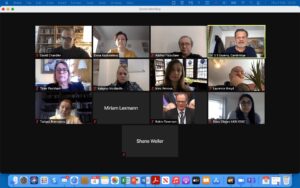 On 4 February 2020 the COMPASS project, represented by PI (Prof. E. Korosteleva), COI (Dr S. Saxena) and PDRA (Dr I. Petrova) had its annual International Advisory Board meeting with many esteemed members in attendance, including Prof. D. Chandler (Chair), Prof. T. Flockhart (Deputy Chair), M. Lexmann MEP, Lord Teverson, Prof. T. Romanova, L. Broyd (FCDO), Prof. K. Nicolaidis (EUI/Oxford), Prof. Alisher Faizullaev (Webster), Dana Olesen (GCRF Officer) and Prof. Shane Weller (PVC Research Kent). PI reported about about the project’s progress, its major challenges and achievements, including the release of over 260 outputs, 28 virtual conferences/workshops, and over 30 high-level events conducted in the course of last year. The future plans, including the project’s possible extension, were also discussed.
On 4 February 2020 the COMPASS project, represented by PI (Prof. E. Korosteleva), COI (Dr S. Saxena) and PDRA (Dr I. Petrova) had its annual International Advisory Board meeting with many esteemed members in attendance, including Prof. D. Chandler (Chair), Prof. T. Flockhart (Deputy Chair), M. Lexmann MEP, Lord Teverson, Prof. T. Romanova, L. Broyd (FCDO), Prof. K. Nicolaidis (EUI/Oxford), Prof. Alisher Faizullaev (Webster), Dana Olesen (GCRF Officer) and Prof. Shane Weller (PVC Research Kent). PI reported about about the project’s progress, its major challenges and achievements, including the release of over 260 outputs, 28 virtual conferences/workshops, and over 30 high-level events conducted in the course of last year. The future plans, including the project’s possible extension, were also discussed.
Conference of young researchers of the BSU Faculty of International Relations “International relations: history, theory, practice”, 4 February 2021
 Academic conference of young researchers of the Faculty of International Relations (FIR) “International Relations: History, Theory, Practice” was held on February 4, 2021 at the BSU (Minsk). About 90 Belarusian and Russian young researchers and specialists in International Relations, Law and Tourism, World Economy, Customs, Diplomatic and Consular Services and Intercultural Communication had a good possibility to discuss the achievements and challenges of the modernity.
Academic conference of young researchers of the Faculty of International Relations (FIR) “International Relations: History, Theory, Practice” was held on February 4, 2021 at the BSU (Minsk). About 90 Belarusian and Russian young researchers and specialists in International Relations, Law and Tourism, World Economy, Customs, Diplomatic and Consular Services and Intercultural Communication had a good possibility to discuss the achievements and challenges of the modernity.
Discussions were organized in eight sections: (1) Actual aspects of foreign policy, diplomatic and consular practice in modern international relations; (2) International law: theory and practice of application in modern conditions; (3) Theoretical and practical problems of international private and integration law; (4) Modern trends in the development of the world economy and international economic relations; (5) Topical issues of customs; (6) Management of mass events; (7) Modern directions of research in the paradigm of intercultural communication; (8) Linguistic and regional studies. 
The conference was organized by the BSU FIR with the support of the GCRF COMPASS. Among the co-organizers are the International Public Association for Research and Information and Educational Programs “Evolutio”, the public association “Center for Foreign Policy and Security Studies”, the public association for European Studies, the public association “Society of International Law”.
Talk on ‘Knowing fish: a sustainability case study in the Caspian and portrait of resource understandings across knowledge systems’, 29 January 2021
Cambridge Central Asia Forum in collaboration with the Centre of
Development Studies and GCRF COMPASS Project, University of Cambridge
invites you to a talk by Callie Berman, Centre of Development Studies, University of Cambridge on ‘Knowing fish: a sustainability case study in the Caspian and portrait of resource understandings across knowledge systems’ as part of the Lent Term Seminar Series
Date: 29 January 2021 Time: 11-1pm (UK time)
You can find the full schedule of the Lent Term Seminar Series here
GCRF COMPASS Work in Progress Seminar with Dr Nodira Azimova, 28 January 2021
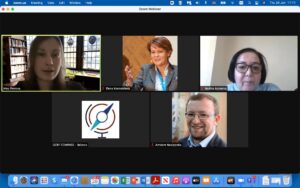 On 28 January 2021 the University of Kent held the first Work-in-Progress Seminar (WiPS) of the Spring term. Dr. Nodira Azimova from the Institute of History of the Academy of Sciences, Republic of Uzbekistan delivered a talk ‘Functions of the Uzbek community (mahalla) after independence’. Nodira argued that mahalla as a community is a self-regulating living organism with a range of functions, which is much broader than the functions of a mahalla committee, although they may coincide to a degree. Analysis of micro-practices allows us to trace socio-cultural life of mahalla from a quantitative and qualitative perspectives through the understanding of the interaction of the community and its administration.
On 28 January 2021 the University of Kent held the first Work-in-Progress Seminar (WiPS) of the Spring term. Dr. Nodira Azimova from the Institute of History of the Academy of Sciences, Republic of Uzbekistan delivered a talk ‘Functions of the Uzbek community (mahalla) after independence’. Nodira argued that mahalla as a community is a self-regulating living organism with a range of functions, which is much broader than the functions of a mahalla committee, although they may coincide to a degree. Analysis of micro-practices allows us to trace socio-cultural life of mahalla from a quantitative and qualitative perspectives through the understanding of the interaction of the community and its administration.
Distinguished Foreign Guest Lecture, 26 January 2021
On January 26, 2021 GCR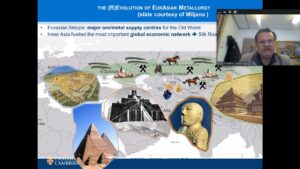 F COMPASS Co-I Dr S. Saxena delivered the Distinguished Foreign Guest Lecture in the Framework of the ‘Belarusian State University – Winter School 2021’. Dr Saxena spoke on ‘Greening Development: A Scientific Understanding of Supply and Value Chain’ and answered a number of questions from the audience that included BSU students from various disciplines.
F COMPASS Co-I Dr S. Saxena delivered the Distinguished Foreign Guest Lecture in the Framework of the ‘Belarusian State University – Winter School 2021’. Dr Saxena spoke on ‘Greening Development: A Scientific Understanding of Supply and Value Chain’ and answered a number of questions from the audience that included BSU students from various disciplines.
Konrad Adenauer Stiftung webinar ‘Belarus at the beginning of 2021’, 25 January 2021
On 25 January 2021, Prof. Korosteleva and Dr. Petrova attended a timely webinar ‘Belarus at the beginning of 2021’ organised by Konrad Adenauer Stiftung (KAS), Belarus Office. The programme included Dr Jakob Wöllenstein, Director KAS (moderator); Miriam Lexmann MEP; Artsiom Shraibman, Political Analyst, Sense Analytics, Belarus; Valery Karbalevich, Political Analyst; Dzmitry Kruk, Research Associate, BEROC; and Valeryja Kastsugova, Political Analyst, Nashe Mnenie. This is part of a series of webinars, organised by KAS to continue discussions about growing tensions in Belarus.
Research and Education Webinar Series with University of Cambridge Graduates (in Russian), 20 January 2021
GCRF COMPASS and Cambridge Central Asia Forum, Jesus College, University of Cambridge invite you to the first talk in the Civil Societies Conversations Webinar Series with the Eurasian Civil Society Leaders (in Russian) by Matluba Salikhova, Chairwoman of Peshraft Charity Organisation from Dushanbe, Tajikistan. In the Civil Societies Conversations Webinar Series with the Eurasian Civil Society Leaders we will engage in a dialogue with local actors and discuss the development of civic initiatives, local communities needs and structures. More information is available in English and Russian. All talks are in Russian.
Moderator: Dr. Diana T. Kudaibergenova, GCRF COMPASS PDRA, Centre of
Development Studies, University of Cambridge
Date: 20 January 2021; Time: 11-1 pm (UK time)
Talk on ‘Precarity, populism and prospects for a green democratic transformation’ 18 January 2021
Dr Albena Azmanova, GCRF COMPASS affiliate from Kent (Brussels), gave a talk on ‘Precarity, populism, and prospects for a green democratic transformation’, on 18 January 2021. This talk is part of a new series Rethinking Populism, which began in response to Chantal Mouffe’s articulation of a ‘left populism’.
Virtual Workshop ‘Shifting geopolitics of the South caucasus after the Nagorno-Karabakh War’, 22 December 2020
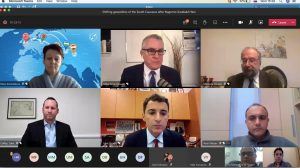 On 22 December 2020 ADA University has organised a virtual workshop ’Shifting geopolitics of the South caucasus after the Nagorno-Karabakh War’. In late September 2020, three decades long Nagorno-Karabakh conflict went into the most violent phase since 1994. Azerbaijan and Armenia were able to reach a new cease-fire agreement through the unilateral mediation of Russia. How long will the peace agreement last, and what are the consequences of the new geopolitics? What is the role for the EU and other international players? The workshop included presentations from local and international experts, policy-makers and practitioners. The full programme is available here
On 22 December 2020 ADA University has organised a virtual workshop ’Shifting geopolitics of the South caucasus after the Nagorno-Karabakh War’. In late September 2020, three decades long Nagorno-Karabakh conflict went into the most violent phase since 1994. Azerbaijan and Armenia were able to reach a new cease-fire agreement through the unilateral mediation of Russia. How long will the peace agreement last, and what are the consequences of the new geopolitics? What is the role for the EU and other international players? The workshop included presentations from local and international experts, policy-makers and practitioners. The full programme is available here
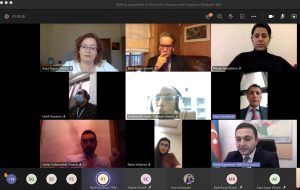
Webinar ‘From Crisis to Catastrophe in Belarus? How International Relations and International Justice can resolve the emergency’, 17 December 2020
On 17 December 2020 at 17.00 Professor Elena Korosteleva participated in the webinar ‘From Crisis to Catastrophe in Belarus? How International Relations and International Justice can resolve the emergency’, organised the Doughty Street Chambers, London. Chaired by Baroness Helena Kennedy QC, speakers included key players from the UN, EU, OSCE and the Council of Europe, as well as diplomats, practitioners and academics immersed in Belarus. International law experts ask whether the international community is up to the job of delivering justice.
European Neighbourhood Council Webinar, 11 December 2020
 On 11 December 2020 Professor Elena Korosteleva was invited to participate, along with Prof. Fabienne Bossuyt and HE Ambassador Peter Burian, at the webinar organised by the European Neighbourhood Council (ENC), where the launch of the report on “Socio-economic Impact of COVID-19 and Media Consumption among Vulnerable Communities in Central Asia” was announced, as a part of “Strengthening Resilience to Radicalisation and Disinformation in Central Asia” project funded by the European Union and implemented by Internews. The event was attended by 85 participants.
On 11 December 2020 Professor Elena Korosteleva was invited to participate, along with Prof. Fabienne Bossuyt and HE Ambassador Peter Burian, at the webinar organised by the European Neighbourhood Council (ENC), where the launch of the report on “Socio-economic Impact of COVID-19 and Media Consumption among Vulnerable Communities in Central Asia” was announced, as a part of “Strengthening Resilience to Radicalisation and Disinformation in Central Asia” project funded by the European Union and implemented by Internews. The event was attended by 85 participants.
Research and Education Webinar Series with University of Cambridge Graduates (in Russian), 9 December 2020
GCRF COMPASS and Cambridge Central Asia Forum, Jesus College, University of Cambridge invite you to the next talk in the Research and Education Webinar Series with the University of Cambridge Graduates (in Russian) by Vepa Malikgulyyev, USAID’s Future Growth Initiative Project on “Private Sector. Development, Science”.
Moderator: Dr. Diana T. Kudaibergenova, GCRF COMPASS PDRA, Centre of
Development Studies, University of Cambridge
Date: 9 December 2020 Time: 11-1 pm (UK time)
Call for Applications to the 3rd GCRF COMPASS International Training School for Early Career Researchers
Talk on ‘Uzbekistan’s Current Development Policy and Priorities’, 4 December 2020
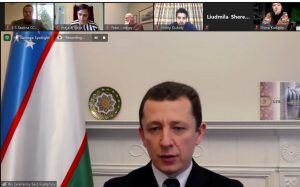 GCRF COMPASS Cambridge hosted Uzbekistan’s Ambassador His Excellency Said Rustamov on 4 December 2020. His talk on ‘Uzbekistan’s Current Development Policy and Priorities’ was engaging, wide ranging and a forthrite address. The talk was chaired by Dr Saxena, University of Cambridge. It was followed by a lively Q&A session with Cambridge students and Academics. His Excellency Said Rustamov discussed development, trade, security, environment, international and regional relations, civil society and labour issues. A recording of the talk is now available on Youtube. (https://youtu.be/w58n76qXGFc)
GCRF COMPASS Cambridge hosted Uzbekistan’s Ambassador His Excellency Said Rustamov on 4 December 2020. His talk on ‘Uzbekistan’s Current Development Policy and Priorities’ was engaging, wide ranging and a forthrite address. The talk was chaired by Dr Saxena, University of Cambridge. It was followed by a lively Q&A session with Cambridge students and Academics. His Excellency Said Rustamov discussed development, trade, security, environment, international and regional relations, civil society and labour issues. A recording of the talk is now available on Youtube. (https://youtu.be/w58n76qXGFc)
GCRF COMPASS Work in Progress Seminar, 3 December 2020
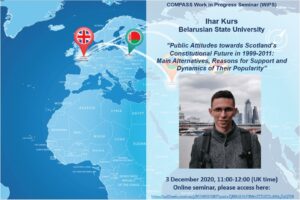 On 3 December 2020 the University of Kent held the final Work-in-Progress Seminar (WiPS) of the Autumn term. Ihar Kurs, doctoral researcher from the Belarusian State University, presented his ongoing research “Public Attitudes towards Scotland’s Constitutional Future in 1999-2011: Main Alternatives, Reasons for Support and Dynamics of Their Popularity”. Ihar argued that since the beginning of the Scottish devolution and the resumption of the regional parliament in 1999, Scotland has entered into a new phase of political development. He discussed the options for the potential constitutional status of the region and examined the factors that influenced political preferences in Scotland.
On 3 December 2020 the University of Kent held the final Work-in-Progress Seminar (WiPS) of the Autumn term. Ihar Kurs, doctoral researcher from the Belarusian State University, presented his ongoing research “Public Attitudes towards Scotland’s Constitutional Future in 1999-2011: Main Alternatives, Reasons for Support and Dynamics of Their Popularity”. Ihar argued that since the beginning of the Scottish devolution and the resumption of the regional parliament in 1999, Scotland has entered into a new phase of political development. He discussed the options for the potential constitutional status of the region and examined the factors that influenced political preferences in Scotland.
Cambridge Central Asia Forum in collaboration with the Centre of Development Studies and GCRF COMPASS Project, University of Cambridge and Embassy of Turkmenistan in the UK invites you to a Panel Discussion on the Neutrality of Turkmenistan on the 3rd December 2020 12-1pm. More information is available here
Announcement of Book Release, 30 November 2020
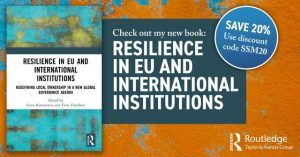 We are delighted to announce the release of our new book by Korosteleva, E. and Flockhart, T. (2020, eds.) Resilience in EU and International Institutions (Routledge, November 30). Exciting accounts of resilience by Nathalie Tocci, David Chandler, Pol Bargues, Jonathan Joseph & Ana Juncos, Rosanne Anholt & Giulia Senatti, Irina Petrova & Laure Delcour, Zach Paikin, Albena Azmanova, Elena Korosteleva and Trine Flockhart.
We are delighted to announce the release of our new book by Korosteleva, E. and Flockhart, T. (2020, eds.) Resilience in EU and International Institutions (Routledge, November 30). Exciting accounts of resilience by Nathalie Tocci, David Chandler, Pol Bargues, Jonathan Joseph & Ana Juncos, Rosanne Anholt & Giulia Senatti, Irina Petrova & Laure Delcour, Zach Paikin, Albena Azmanova, Elena Korosteleva and Trine Flockhart.
Implications of the Pandemic
Dr Albena Azmanova’s, GCRF COMPASS affiliate, recent work, where she discusses the implications of the pandemic for the world economic and social wellbeing, as conditioned by the precarious nature of capitalism, are cited worldwide: https://m.polit.ru/article/2020/06/24/newideaspandemic/
http://freeconomy.ru/themes/mezhdunarodnyj-komitet/dzhejms-gelbrejt-vinovatye-est.html
Her many articles have now been translated into 8 languages, and her conclusions are based on her latest book Capitalism on Edge. How Fighting Precarity Can Achieve Radical Change Without Crisis or Utopia (Columbia University Press, 2020)
Lecture ‘Decolonizing Central Asian International Relations: Central Asia in Post-Colonial Age’, 27 November 2020
Cambridge Central Asia Forum in collaboration with the Centre of Development Studies and GCRF COMPASS Project invites you to a talk by Professor Timur Dadabaev, Faculty of Humanities and Social Sciences, Tsukuba University, on ‘Decolonizing Central Asian International Relations: Central Asia in Post-Colonial Age’ on 27 November 2020, 11:00 – 13:00 (GMT). More information can be found here.
Webinar link
Meeting ID: 978 9763 6079
Passcode: 080055)
COMPASS project strategic partnership with the Minsk Dialogue Policy Forum, 25-27 November 2020
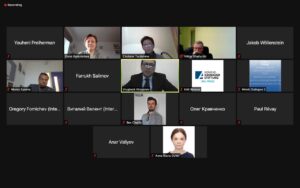 Despite the complex challenges within and across the region, COVID-19 including, the organisers of the Minsk Dialogue Policy Forum, in strategic partnership with the GCRF COMPASS project and Konrad Adenauer Foundation, decided to go ahead with it, in a virtual form. This made it a forth forum in the history of this event, which brought together over 200 participants from around the globe
Despite the complex challenges within and across the region, COVID-19 including, the organisers of the Minsk Dialogue Policy Forum, in strategic partnership with the GCRF COMPASS project and Konrad Adenauer Foundation, decided to go ahead with it, in a virtual form. This made it a forth forum in the history of this event, which brought together over 200 participants from around the globe  and which successfully accommodated so many different time zones – from China to the USA! It also hosted an envious and esteemed range of speakers who explored the implications of Belarus Crisis for the region and the world. It also explored the crisis implications for Central Eurasia, which included members of the GCRF COMPASS and GCRF GOOD-Neighbour consortia: Prof. Victor Shadursky (BSU); Prof. Siddharth Saxena (University of Cambridge); Prof. Anar Valiyev (ADA University); Prof. Cholpon Turdalieva (AUCA); Prof. Farrukh Salimov (TNU) and Prof. Ulugbeck Khasanov (UWED), with Prof. Elena Korosteleva acting as moderator. For more information please see the programme here, and the links to the event here.
and which successfully accommodated so many different time zones – from China to the USA! It also hosted an envious and esteemed range of speakers who explored the implications of Belarus Crisis for the region and the world. It also explored the crisis implications for Central Eurasia, which included members of the GCRF COMPASS and GCRF GOOD-Neighbour consortia: Prof. Victor Shadursky (BSU); Prof. Siddharth Saxena (University of Cambridge); Prof. Anar Valiyev (ADA University); Prof. Cholpon Turdalieva (AUCA); Prof. Farrukh Salimov (TNU) and Prof. Ulugbeck Khasanov (UWED), with Prof. Elena Korosteleva acting as moderator. For more information please see the programme here, and the links to the event here.
GCRF COMPASS Work in Progress Seminar, 19 November 2020
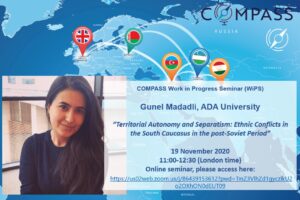 On 19 November 2020 the University of Kent held a Work-in-Progress Seminar (WiPS) with Gunel Madadli, a graduate student at ADA University in Azerbaijan. The discussion focused on Gunel’s doctoral proposal “Territorial Autonomy and Separatism: Ethnic Conflicts in the South Caucasus in the post-Soviet Period”. Gunel argued that the relationship between autonomy and separatist movements is a frequently discussed topic due to its significance in the self-management of minority groups. Considering several ethnic conflicts had demands for autonomy and some ethnic conflicts have been resolved by concession of autonomy, Gunel questioned whether territorial autonomy has become a strategy for defusing conflict.
On 19 November 2020 the University of Kent held a Work-in-Progress Seminar (WiPS) with Gunel Madadli, a graduate student at ADA University in Azerbaijan. The discussion focused on Gunel’s doctoral proposal “Territorial Autonomy and Separatism: Ethnic Conflicts in the South Caucasus in the post-Soviet Period”. Gunel argued that the relationship between autonomy and separatist movements is a frequently discussed topic due to its significance in the self-management of minority groups. Considering several ethnic conflicts had demands for autonomy and some ethnic conflicts have been resolved by concession of autonomy, Gunel questioned whether territorial autonomy has become a strategy for defusing conflict.
Documenting Human Rights Violations in Belarus, 25 November 2020
The International Commission of Jurors (ICJ), in partnership with Belarus International Committee, UK academics and experts, Belarusian lawyers and civil society, organised a working roundtable to discuss ways of documenting violations of human rights in Belarus, and focusing on issues of collection of evidence and accountability, and international cooperation. The meeting was held under the Chatham House rule.
Lecture “Cultural diplomacy and Civil Society in Eurasia”, 19 November 2020
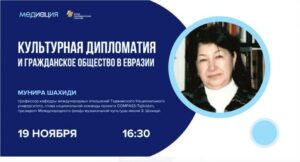 GCRF COMPASS is pleased to invite you to the lecture of Professor Munira Sahidi titled “Cultural diplomacy and Civil Society in Eurasia”. The lecture will take place in Russian on Zoom on 19th November 2020 at 16:00 Moscow time.
GCRF COMPASS is pleased to invite you to the lecture of Professor Munira Sahidi titled “Cultural diplomacy and Civil Society in Eurasia”. The lecture will take place in Russian on Zoom on 19th November 2020 at 16:00 Moscow time.Book: Capitalism on the Edge: How fighting precocity can achieve radical change without crisis or utopia
COMPASS’s associate, Dr Albena Azmanova’s book Capitalism on the Edge: How fighting precocity can achieve radical change without crisis or utopia (Columbia University Prtess 2020), has become the top recommendation for reading about capitalism and its failing resilience, as was advised by Prof. Galbraith from the University of Texas at Austin, available here
Chatham House Discussion: Moldova’s Presidential Election Results, 17 November 2020
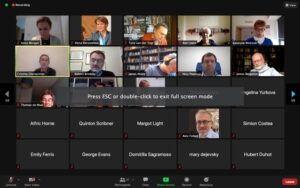 On 17 November Professor Korosteleva participated in the discussion of Moldova’s presidential election results, organised by Chatham House, with Cristina Gherasimov, Research Fellow from Robert Bosch Centre of the German Council on Foreign Relations; and Nicu Popescu, Director, Wider Europe Programme, European Council on Foreign Relations as speakers. The discussion was moderated by Katarina Wolczuk, Associate Fellow, Chatham House, and addressed the pitfalls and challenges of the electoral campaign and its results; and touched upon Moldova’s future foreign policy trajectory and its domestic political landscape.
On 17 November Professor Korosteleva participated in the discussion of Moldova’s presidential election results, organised by Chatham House, with Cristina Gherasimov, Research Fellow from Robert Bosch Centre of the German Council on Foreign Relations; and Nicu Popescu, Director, Wider Europe Programme, European Council on Foreign Relations as speakers. The discussion was moderated by Katarina Wolczuk, Associate Fellow, Chatham House, and addressed the pitfalls and challenges of the electoral campaign and its results; and touched upon Moldova’s future foreign policy trajectory and its domestic political landscape.
Panel Discussion: Interacting with China in a Complex World, 17 November 2020
China Forum invites you to a panel discussion on Tuesday 17 November from 3.30 – 5.30pm. The details include a link to register for the event and a separate link via which questions may be submitted for the panel’s consideration.
The event will begin with a short WPP video presentation, introduced by David Roth, CEO The Store WPP, Chairman BrandZ and BAV Group, Global.
The meeting will be chaired by Prof Peter Nolan, University of Cambridge
Panelists
Rt Hon Sir Oliver Letwin (Director, Project for Peaceful Comp Ltd,
formerly Project for Peaceful Coexistence Ltd; former Chancellor of the
Duchy of Lancaster and former Minister for Government Policy, HMG)
Professor Peter Littlewood (Founding Executive Chair, The Faraday
Institution; Former Director, Argonne National Laboratory; Professor of
Physics, University of Chicago)
Lord Jim O’Neill (Chair, Chatham House; Vice Chair, The Northern
Powerhouse Partnership; former Commercial Secretary to the Treasury,
HMG)
Lord Adair Turner (Chair, Energy Transitions Committee; Senior Fellow
and former Chair, Institute for New Economic Thinking; former Chair, UK
Financial Services Authority)
Dr Jin Zhang (Deputy Director, China Centre, Jesus College Cambridge;
Senior Research Fellow, Cambridge China Development Trust)
Critical Theory Round Table, 14-15 November 2020
Azmanova, A. is giving a talk at the Critical Theory Round Table: A.Azmanova, “From Metacrisis of Capitalism to Transformative Radicalism: Has the Covid Pandemic Cleared the Way?” on 14-15 November 2020. The workshop will have a range of exciting and prominent speakers, including Robert Engelman, “Propaganda’s Soft Power”; Antonio Pele, “‘Necro-Counterrevolution’ in Brazil“, John Min, “Power and Reason”; Jessica Cristianetti, “Nancy Fraser’s Theory of Justice”; Matthew Shafer, “Matter, History, Critique”; Teddy Harrison, “Burdened Virtues and the Lifeworlds of Law”; Wayne Wapeemukwa, “Immanent or Indigenous?”: Rochelle DuFord, “It’s a Racket!”; Albena Azmanova, “From Metacrisis of Capitalism to Transformative Radicalism”; and Andrew Burnside, “Critical Commodities”
Workshop ‘Belarus in the Contemporary Geopolitical Processes, 12-13 November 2020
On 12-13 November 2020, Professor Elena Korosteleva participated in a two-day workshop ‘ Belarus in the contemporary geopolitical processes’, organised conjointly by Konrad Adenauer Stiftung and the History Institute of the Belarusian Academy of Sciences. The speakers included Prof. Roza Turarbekova (BSU, and COMPASS affiliate), Alexey Ivantsov (EAEU Commission), Dmitry Stratievsky (Director, Osteuropa–Zentrum Berlin), Prof. Elena Babkina (Head of Law School BSU), Dr Denis Bukonkin (Director, Centre for Foreign Policy Research, Belarus), Yauheni Preiherman (Minsk Dialogue Initiative and COMPASS member), Prof. Alexey Gromyko (Director, Europe Institute RAS, Russia), and many more. The full programme is available here.
GCRF COMPASS Work in Progress Seminar, 12 November 2020
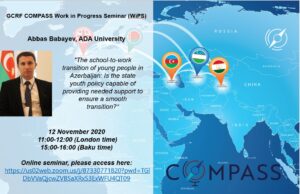 On 12 November 2020 the University of Kent held a Work-in-Progress Seminar (WiPS) with Abbas Babayev, a graduate student of Public Administration (MPA) at ADA University in Azerbaijan. Abbas presented his master’s thesis “The school-to-work transition of young people in Azerbaijan: Is the state youth policy capable of providing needed support to ensure a smooth transition?”, which he successfully defended a day earlier.
On 12 November 2020 the University of Kent held a Work-in-Progress Seminar (WiPS) with Abbas Babayev, a graduate student of Public Administration (MPA) at ADA University in Azerbaijan. Abbas presented his master’s thesis “The school-to-work transition of young people in Azerbaijan: Is the state youth policy capable of providing needed support to ensure a smooth transition?”, which he successfully defended a day earlier.
Research and Education Webinar Series with University of Cambridge Graduates (in Russian), 4 November 2020
GCRF COMPASS and Cambridge Central Asia Forum, Jesus College, University of
Cambridge invite you to the next talk in the Research and Education Webinar Series with the University of Cambridge Graduates (in Russian) by Dr. Chokan Laumulin, Satbayev University, Almaty, Kazakhstan on “Science: Connecting Cambridge and Eurasia”.
The Politics and Aesthetics of Textiles on the Silk Road, Webinar, 30 October 2020
Cambridge Central Asia Forum in collaboration with the Centre of Development Studies and GCRF COMPASS invites you to a talk by Dr Emma Dick, Middlesex University London on 30th October 11:00 to 13:00 (GMT).
Please RSVP to Prajakti Kalra (pk315@cam.ac.uk) for the Webinar link to attend the talk.
XIX International Scientific Conference, ‘Belarus in the Modern World’, BSU, Belarus, 29 October, 2020
The XIX International Scientific Conference ‘Belarus in the Modern World’ took place on 29 October 2020 at BSU with the support of GCRF COMPASS. Due to the COVID-19 situation the conference, all panels and round tables were held in blended mode (using different on-line platforms) and all necessary restrictions were respected.
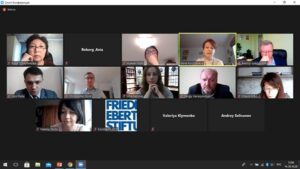
The conference brought together about 150 participants – leading scholars, experts and policymakers as well as junior researchers from Belarus, Russia, Ukraine, Germany, United Kingdom, Azerbaijan, Estonia. The conference included 10 parallel sections covering issues related to theory and practice of international relations, Belarusian foreign policy, international law, economic relations, security studies and others.
The conference also hosted a round-table titled “75th Anniversary of the United Nations” and three international round tables: “Baltic Sea Region: Cooperation without Limits?”, “Eurasian Network of Regional Initiatives and Organizations: Elements of Interconnection” (with support of FES and GCRF COMPASS), “Relations of Belarus with Countries of Wider Eurasia” (GCRF COMPASS). Representatives of partner universities (Kent, ADA, BSU) took part in the round tables. The latest involved academics from Belarus, Azerbaijan and the United Kingdom and was off-the-record to create space for an open exchange of observations and opinions regarding understanding reasons and implications of crises and challenges that Belarus and its partners are facing.
The conference did not have a thematic focus this year but commemorated the 25th anniversary of the BSU Faculty of International Relations.
Publication of the Conference proceedings and collection of papers (both to be availed in e-repositories and as hard-copies) is planned for early 2021.
Further information is available online using the following links:
Release by news-agency Minsk-Novosti
Social media post on round table on Eurasian integration
Eurasian network of regional initiatives and organisations: element of connectivity’, 29 October 2020
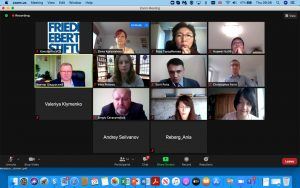 At the initiative of Professor Roza Turarbekova, Belarusian State University, conjointly with the COMPASS project and Friedrich Ebert Stiftung, organised an international roundtable on the theme of ‘Eurasian network of regional initiatives and organisations’, on 29 October 2020. The roundtable discussed the issues and challenges of Eurasian integration and the role of core organisations and regional players and initiatives in strengthening or wearing this process, especially in the circumstances of ongoing regional transformations, and global economic and health crises. The workshop was opened by Professor Elena Korosteleva (Kent), Professor Victor Shadurski (BSU) and Christopher Forst (FE Stiftung), and consisted of two sessions, moderated by Professor Roza Turarbekova, and Professor Elena Korosteleva. From Kent the speakers included Dr Irina Petrova and Huawei Zheng, who delivered his presentation in Russian! Full programme is available here.
At the initiative of Professor Roza Turarbekova, Belarusian State University, conjointly with the COMPASS project and Friedrich Ebert Stiftung, organised an international roundtable on the theme of ‘Eurasian network of regional initiatives and organisations’, on 29 October 2020. The roundtable discussed the issues and challenges of Eurasian integration and the role of core organisations and regional players and initiatives in strengthening or wearing this process, especially in the circumstances of ongoing regional transformations, and global economic and health crises. The workshop was opened by Professor Elena Korosteleva (Kent), Professor Victor Shadurski (BSU) and Christopher Forst (FE Stiftung), and consisted of two sessions, moderated by Professor Roza Turarbekova, and Professor Elena Korosteleva. From Kent the speakers included Dr Irina Petrova and Huawei Zheng, who delivered his presentation in Russian! Full programme is available here.
3rd Doughty Street Chambers webinar on Belarus ‘The Dark Before the Dawn? Belarus’ Future Explored (by invitation only), 22 October 2020

Under the auspices of the Belarus International Committee, a 3rd webinar on Belarus was organised on 22 October 2020. The speakers included Franak Viačorka, Sviatlana Tikhanovskaya’s representative on foreign affairs; Vice President of the Digital Communication Network and consultant for U.S. Agency for Global Media; Olga Kovalkova, Sviatlana Tikhanovskaya’s confidant in the Presidium of the Coordination Council; Pavel Latushko, a member of the Presidium of the Belarusian Coordination Council, formerly Minister of Culture and Belarusian Ambassador to Poland and France; Nikolai Khalezin, Free Belarus Theatre, Co-Founding Artistic Director; Aleksey Yerokhovets, Sviatlana’s Tikhanovskaya’s representative for the Belarusian Global Diaspora; Aleś Alachnovič, CASE Belarus, Sviatlana Tikhanovskaya’s representative on economic matters; Natalia Kaliada, Free Belarus Theatre, Co-Founding Artistic Director/CEO of Belarus Free Theatre (BFT), writer, diplomat and human rights campaigner; and Anatoly Kotov, former member of the President’s Office, Belarus;moderated by Baroness Kennedy QC, House of Lords.
The speakers talked about the role of the Belarusian Coordination Council; and discussed proposed constitutional reforms; a strategy past the 25-October deadline as set by the Coordination Council; the unification of global diaspora; economic crisis and anti-crisis reforms and stabilisation strategy. The webinar was attended by members of the European Parliament; European Commission; European External Action Service; Foreign & Commonwealth and Development Office; Westminster; EBRD; World Bank; Council of Europe; ICC; OSCE and more. The full programme of the event is available here.
Education Beyond Frontiers – Triple Helix (education / business / government links), 23 October 2020
Cambridge Central Asia Forum in collaboration with the Centre of
Development Studies, GCRF COMPASS and British Kazakh Society invite you
to a panel discussion on ‘Education beyond Frontiers – Triple Helix (education / business / government links’ on 23rd October 2020 11 am to 1 pm UK time via Zoom. Register at: https://www.bksoc.org.uk/event-details/education-beyond-frontiers-triple-helix-education-business-government-links/form. For any queries please contact Prajakti Kalra at (pk315@cam.ac.uk).
Minos Gent – Belarus: Where is the EU? – Research Webinar, 20 October 2020
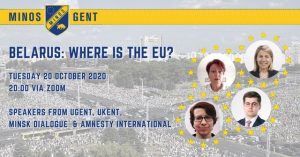 The students of Ghent University invited Professor Fabienne Bossuyt (Ghent, and COMPASS AB member), Professor Elena Korosteleva (Kent and COMPASS PI), Yauheni Preiherman (BSU COMPASS and Minsk Dialogue Initiative) and Dr Nadzeya Husakouskaya (Amnesty International London), to discuss change in Belarus and the EU response. The two-hour webinar involved 40 participants with an in-depth Q&A and a short presentation from every speaker. The full programme is available here.
The students of Ghent University invited Professor Fabienne Bossuyt (Ghent, and COMPASS AB member), Professor Elena Korosteleva (Kent and COMPASS PI), Yauheni Preiherman (BSU COMPASS and Minsk Dialogue Initiative) and Dr Nadzeya Husakouskaya (Amnesty International London), to discuss change in Belarus and the EU response. The two-hour webinar involved 40 participants with an in-depth Q&A and a short presentation from every speaker. The full programme is available here.
Talk on ‘Peace and Reconciliation in Afghanistan’, 16 October 2020
Cambridge Central Asia Forum in collaboration with the Centre of Development Studies and GCRF COMPASS invites you to a talk by His Excellency Said T. Jawad, Ambassador of the Republic of Afghanistan to the UK.
Date: 16 October 2020
Time: 11-1pm
Venue: Webinar (Zoom link on request from pk315@cam.ac.uk)
Research and Education Webinar Series with University of Cambridge Graduates (in Russian), 14 October 2020
The next talk in the Research and Education Webinar Series will be on Wednesday, 14 October 2020 by Dr T. Yunusov, University of Cambridge on the topic ‘Global Challenges: Climate Change’
Time: 11-1pm (UK Time)
Venue: Zoom (RSVP to dk406@cam.ac.uk for link)
Language: Russian
Wider audiences can watch the live broadcasting of the talk on the Tengri
News website which is our information partner via this link –
https://tengrinews.kz/news/onlayn-lektsii-ot-vyipusknikov-kembridja-vaktsinyi-415556/ or on Facebook group of Cambridge Central Asia Forum (also live): https://www.facebook.com/groups/23455738627/ on the day.
Please be advised that times have to be adjusted to local time differences. All participants will have a chance to ask Dr. Yunusov any questions and he said he is also preparing a short presentation on his journey of becoming a Cambridge academic. More details can be found here
The Summit of Minds: Entering the New World – a global Forum, 10 October 2020
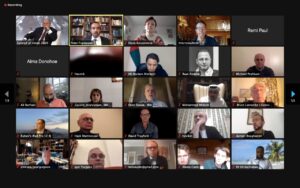 Professor Korosteleva participated in the virtual Summit of Minds 2020 speaking about the return of geopolitics in a new form, and the need to move to a new vision and understanding of the world as more complex, non-linear, unpredictable and local, where every person matters, and small states should seize the opportunity to define and defend their vision for a more cooperative and sustainable future. Other panel speakers included Mr Kasperski, CEO of Kaspersky Lab; Mr Malige, EBRD Managing Director for Eastern Europe and Caucasus; Professor Karaganov, Dean HSE Moscow, Dr Shvydkoy, Special Representative of the Russian President for International Cultural Cooperation; and H.E. Fried, Distinguished Fellow of the Future Europe Initiative, Atlantic Council. The full programme is available here. The summit also included the launch of a new initiative ‘Smart Small States’ Club by President Armen Sarkissian, with comments from Thierry Malleret, Managing Partner of the Monthly Barometer; and Professor Frankopan, University of Oxford.
Professor Korosteleva participated in the virtual Summit of Minds 2020 speaking about the return of geopolitics in a new form, and the need to move to a new vision and understanding of the world as more complex, non-linear, unpredictable and local, where every person matters, and small states should seize the opportunity to define and defend their vision for a more cooperative and sustainable future. Other panel speakers included Mr Kasperski, CEO of Kaspersky Lab; Mr Malige, EBRD Managing Director for Eastern Europe and Caucasus; Professor Karaganov, Dean HSE Moscow, Dr Shvydkoy, Special Representative of the Russian President for International Cultural Cooperation; and H.E. Fried, Distinguished Fellow of the Future Europe Initiative, Atlantic Council. The full programme is available here. The summit also included the launch of a new initiative ‘Smart Small States’ Club by President Armen Sarkissian, with comments from Thierry Malleret, Managing Partner of the Monthly Barometer; and Professor Frankopan, University of Oxford.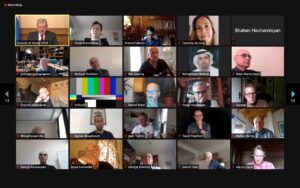
GLOBSEC Bratislava Forum 2020 ‘Let’s Heal the World Together’ 7-8 October 2020
7-8 October 2020: Professor Korosteleva was invited to join the GLOBSEC Bratislava Forum 2020 ‘Let’s Heal the World Together’. The coronavirus pandemic accentuated the need for the international community to come together to resolve an unprecedented global health and economic crisis. It also revealed how fragmented and uncertain the world has become. Under the overarching theme “Let’s Heal the World Together“, the discussion has focused on the most pressing issues that need to be resolved in order to quickly recover from the Great Lockdown, and to build safer, more prosperous and resilient societies. For the first time GLOBSEC will be held in a hybrid format, the international community will be involved in the Forum both virtually and in-person.
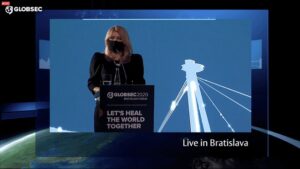 The star cast of speakers included H.E. Zuzana Caputova, Slovak President; H.E. Madeleine Albright; H.E. Sebastian Kurz, Chancellor of Austria; COMPASS Advisory Board member, Nathalie Tocci, IAI Director; Svitalan Tikhanovskaya, Presidential Candidate 2020 Belarus Election and many more (for full details please visit here). Professor Korosteleva was invited to contribute to the discussion at the panel ‘Eastern Partnership: The Impact of Regional Political Crisis on the Civil Society and Increased Resilience for Unfolding Trends’, also involving Ivan Krastev, Chairman of the Centre for Liberal Strategies and Permanent Fellow at the Institute for Human Sciences (IWM); Karatína Mathernová, Deputy Director-General, European Neighborhood and Enlargement Negotiations, European Commission; Corina Rebegea, Director for Democratic Resilience, Center for European Policy Analysis (CEPA); and Thomas de Waal, Senior Fellow, Carnegie Europe. The focus was on political and security crises in the Eastern Partnership countries, and the role of civil society in helping people to cope with crises and build their resilience.
The star cast of speakers included H.E. Zuzana Caputova, Slovak President; H.E. Madeleine Albright; H.E. Sebastian Kurz, Chancellor of Austria; COMPASS Advisory Board member, Nathalie Tocci, IAI Director; Svitalan Tikhanovskaya, Presidential Candidate 2020 Belarus Election and many more (for full details please visit here). Professor Korosteleva was invited to contribute to the discussion at the panel ‘Eastern Partnership: The Impact of Regional Political Crisis on the Civil Society and Increased Resilience for Unfolding Trends’, also involving Ivan Krastev, Chairman of the Centre for Liberal Strategies and Permanent Fellow at the Institute for Human Sciences (IWM); Karatína Mathernová, Deputy Director-General, European Neighborhood and Enlargement Negotiations, European Commission; Corina Rebegea, Director for Democratic Resilience, Center for European Policy Analysis (CEPA); and Thomas de Waal, Senior Fellow, Carnegie Europe. The focus was on political and security crises in the Eastern Partnership countries, and the role of civil society in helping people to cope with crises and build their resilience.
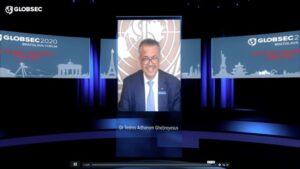
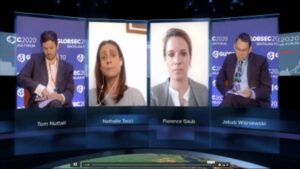
Book Launch, 1 October 2020
Dr Diana T. Kudaibergenova was invited by MECACS Seminar Series, St Andrews University for Book Launch of her new book, ‘Toward Nationalising Regimes: Conceptualizing Power and Identity in the Post-Soviet Realm’ (UP Pittsburgh, 2020). It was an online webinar where she discussed the book and answered questions about her work, research and interests. https://events.st-andrews.ac.uk/events/mecacs-seminar-series-book-launch-of-the-toward-nationalising-regimes-conceptualizing-power-and-identity-in-the-post-soviet-realm-up-pittsburgh-2020/
The EU’s Eastern Partnership and its strategic vision for 2020+ in the times of upheaval, 30 September 2020
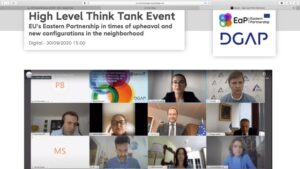 On 30 September 2020 Professor Korosteleva was invited to participate in the 2nd (digital) High-Level Think Tank event dedicated to The EU’s Eastern Partnership and its strategic vision for 2020+ in the times of upheaval, to deliberate on the new format of engagement and configurations in the neighbourhood. The speakers included: Daniela Schwarzer, Director, DGAP; Katariná Mathernová, Deputy Director General, European Commission, DG NEAR; Luc Devigne, Acting Managing Director, Russia, Eastern Partnership, Central Asia, Regional Cooperation and OSCE, European External Action Service; Michael Siebert, Ambassador, Director for Eastern Europe, the Caucasus and Central Asia, German Federal Foreign Office; Miriam Lexmann, Member of European Parliament, European People’s Party; Sinikukka Saari, Senior Associate Analyst, European Union Institute for Security Studies (EUISS) and Hennadiy Maksak, Executive Director, Foreign Policy Council “Ukrainian Prism”. The key points discussed during the event were i) support for Belarus and especially the people and civil society; ii) support to the region in general to prop up the crumbling health systems under CV19, provide socio-economic recovery, and offer help to the vulnerable and civic society; and iii) security issues in the Caucasus, which require urgent attention and resolution.
On 30 September 2020 Professor Korosteleva was invited to participate in the 2nd (digital) High-Level Think Tank event dedicated to The EU’s Eastern Partnership and its strategic vision for 2020+ in the times of upheaval, to deliberate on the new format of engagement and configurations in the neighbourhood. The speakers included: Daniela Schwarzer, Director, DGAP; Katariná Mathernová, Deputy Director General, European Commission, DG NEAR; Luc Devigne, Acting Managing Director, Russia, Eastern Partnership, Central Asia, Regional Cooperation and OSCE, European External Action Service; Michael Siebert, Ambassador, Director for Eastern Europe, the Caucasus and Central Asia, German Federal Foreign Office; Miriam Lexmann, Member of European Parliament, European People’s Party; Sinikukka Saari, Senior Associate Analyst, European Union Institute for Security Studies (EUISS) and Hennadiy Maksak, Executive Director, Foreign Policy Council “Ukrainian Prism”. The key points discussed during the event were i) support for Belarus and especially the people and civil society; ii) support to the region in general to prop up the crumbling health systems under CV19, provide socio-economic recovery, and offer help to the vulnerable and civic society; and iii) security issues in the Caucasus, which require urgent attention and resolution.4th Global Conference on Business & Technology 2020, 26-27 September 2020
Dr Saxena was keynote speaker at the GCBT 2020 conference on subjects of Business & Technology. Dr Saxena’s talk was on ‘Higher Education and world business cooperation approach’. Dr Saxena spoke about the need for businesses to understand cooperation with academia is not about one dimentional product oriented R&D, but about mulilevel engagement with scientific research and human capital development to achieve a sustaibale future for all. Other speakers included UK Labour Party MPs and academics from UK universities.
Research and Education Series with University of Cambridge Graduates
GCRF COMPASS in collaboration with Centre of Development Studies, University of Cambridge and Cambridge Central Asia Forum, Jesus College, University of Cambridge is proud to announce the Research and Education Series with Uni of Cambridge graduates directed towards the youth in Central Asia and wider Eurasia starting on the 30th of September. The programme will be in Russian and will be made available online after each talk
More information about the events and speakers can be found here and by e-mailing dk406@cam.ac.uk. You can follow Cambridge Central Asia Forum news on www.centralasia.group.cam.ac.uk
Belarus on the Edge: Europe on the Brink?

Professor Elena Korosteleva, conjointly with Doughty Street Chambers, Bar Human Rights Committee, and Human Rights Institute, organised the second webinar on the crisis in Belarus titled ‘Belarus on the Edge: Europe on the Brink?’ which took place 24 September 2020 via zoom (recording is available here). The situation in Belarus is worrying. Nearly 13,000 people have been detained. 300 were detained on Wednesday alone when Lukashenko had the temerity to be sworn in as President in private. The formal opposition is either under arrest or forced out of Belarus. Activists continue to be harassed, intimidated or imprisoned, with regime threatening parents with revocation of their rights and taking children to custody if parents continue to protest: see here
The speakers included Natallia Satsunkevich (NGO Viasna Belarus), Pavel Kuryan (Belarus/International lawyer), Julia Korosteleva (Professor in Business Economics UCL SSEES), Bill Bowring (Professor of Law and Human Rights, Birkbeck College), Boriss Cilevics (COE and PACE OSCE), and Nadzeya Husakouskaya (Amnesty International). Baroness Kennedy was chairing the discussion, and Professor Elena Korosteleva offered concluding remarks, also mentioning about the launch of the Belarus International Committee. The speakers addressed the issue of human rights violations, economic issues, smart sanctions, legal and political instruments to put pressure on the regime, and the gender dimension of the protests. The webinar attracted over 150 participants, and will continue monitoring the situation in Belarus.
Lecture by Professor Munira Shahidi at Moscow State University, 18 September 2020
 Professor Munira Shahidi from Tajik National University and the GCRF COMPASS National Lead, gave a lecture titled ’The Crisis of modernity and the poetics of civil society: Central Asia in a Global World’ at the Moscow State University. Professor Shahidi connected the challenges of modernity with the history and culture of the region, and drew comparisons of wholesomeness of the poetics of civil society in Tajikistan and western world. This talk has inaugurated the beginning of the forthcoming lecture series ’The Atlas of Eurasia’ organised by Moscow State University. For full lecture recording please visit here
Professor Munira Shahidi from Tajik National University and the GCRF COMPASS National Lead, gave a lecture titled ’The Crisis of modernity and the poetics of civil society: Central Asia in a Global World’ at the Moscow State University. Professor Shahidi connected the challenges of modernity with the history and culture of the region, and drew comparisons of wholesomeness of the poetics of civil society in Tajikistan and western world. This talk has inaugurated the beginning of the forthcoming lecture series ’The Atlas of Eurasia’ organised by Moscow State University. For full lecture recording please visit here
International Conference on “Impact of the Pandemic on Central Asia: Initial Lessons, Coronacrisis and Prospects for Transformation”, 16-17 September 2020
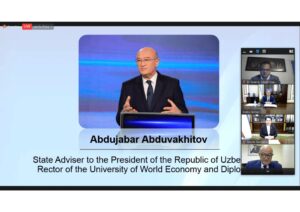 The International Conference on “Impact of the Pandemic on Central Asia: Initial Lessons, Coronacrisis and Prospects for Transformation”, UWED, Uzbekistan, 16-17 September 2020. Prof Kososteleva, Dr Saxena and GCRF partners from Belarus State University, Tajikistan National University and ADA University were invited to speak at the conference on the Impact of the Pandemic on Central Asia in a webinar organised by the Oily Majlis of Uzbekistan and UWED on 16-17 September. Welcome notes were given by g Ms., H.E. Tanzila Narbaeva, Chairwoman of the Senate of Parliament (Oliy Majlis) of the Republic of Uzbekistan and Prof. Abdujabar Abduvakhitov, State Adviser to the President of the Republic of Uzbekistan, Rector of the University of World Economy and Diplomacy. The meeting was introduced by Senator. Sodyq Safoev, First Deputy Chairman of the Senate of the Oliy Majlis of the Republic of Uzbekistan. Other notable speakers were Prof Frederick Starr, Founder and Chairman of the Central Asia-Caucasus Institute & Silk Road Studies Program and HE Matilda Dimovska UNDP Resident Representative in Uzbekistan.
The International Conference on “Impact of the Pandemic on Central Asia: Initial Lessons, Coronacrisis and Prospects for Transformation”, UWED, Uzbekistan, 16-17 September 2020. Prof Kososteleva, Dr Saxena and GCRF partners from Belarus State University, Tajikistan National University and ADA University were invited to speak at the conference on the Impact of the Pandemic on Central Asia in a webinar organised by the Oily Majlis of Uzbekistan and UWED on 16-17 September. Welcome notes were given by g Ms., H.E. Tanzila Narbaeva, Chairwoman of the Senate of Parliament (Oliy Majlis) of the Republic of Uzbekistan and Prof. Abdujabar Abduvakhitov, State Adviser to the President of the Republic of Uzbekistan, Rector of the University of World Economy and Diplomacy. The meeting was introduced by Senator. Sodyq Safoev, First Deputy Chairman of the Senate of the Oliy Majlis of the Republic of Uzbekistan. Other notable speakers were Prof Frederick Starr, Founder and Chairman of the Central Asia-Caucasus Institute & Silk Road Studies Program and HE Matilda Dimovska UNDP Resident Representative in Uzbekistan.
25th Anniversary of the Neutrality of Turkmenistan, 16 September 2020
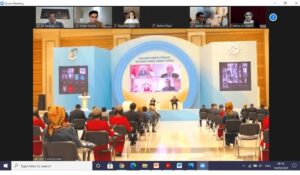 Dr Saxena was invited to speak at a media forum was held in Turkmenistan with the participation of representatives of the diplomatic corps of Turkmenistan and media on the occasion of the 25th Anniversary of the Neutrality of Turkmenistan and the 75th Anniversary of the UN General Assembly sessions, where Turkmenistan was elected to the Vice-Chairmanship of the 75th session of the UN General Assembly. Politicians, specialists in the field of international relations and journalists from various countries are invited to this event.
Dr Saxena was invited to speak at a media forum was held in Turkmenistan with the participation of representatives of the diplomatic corps of Turkmenistan and media on the occasion of the 25th Anniversary of the Neutrality of Turkmenistan and the 75th Anniversary of the UN General Assembly sessions, where Turkmenistan was elected to the Vice-Chairmanship of the 75th session of the UN General Assembly. Politicians, specialists in the field of international relations and journalists from various countries are invited to this event.
Award of Tashkent Jean Monnet Centre of Excellence for European Studies to UWED
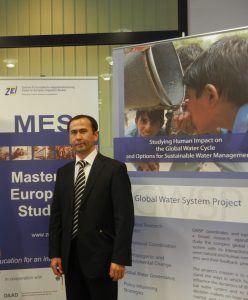 Professor Khaydarali Yunusov from UWED has been awarded a prestigious Jean Monnet Center of Excellence project in September 2020. He said: ‘ This successful application is a breakthrough for our university, and at the same time, a well-deserved recognition of our research focus and scientific capacity’. The UWED`s Tashkent Jean Monnet Center of Excellence intends to be a focal point for competences and knowledge about the European studies in Uzbekistan. The Project combines the three type of activities in the field of EU studies: teaching, research and awareness raising dissemination through open public debates and publications. It offers a new, more institutionalized, centralized, and specialized form of European studies for the Uzbek academic world.
Professor Khaydarali Yunusov from UWED has been awarded a prestigious Jean Monnet Center of Excellence project in September 2020. He said: ‘ This successful application is a breakthrough for our university, and at the same time, a well-deserved recognition of our research focus and scientific capacity’. The UWED`s Tashkent Jean Monnet Center of Excellence intends to be a focal point for competences and knowledge about the European studies in Uzbekistan. The Project combines the three type of activities in the field of EU studies: teaching, research and awareness raising dissemination through open public debates and publications. It offers a new, more institutionalized, centralized, and specialized form of European studies for the Uzbek academic world.
This project also capitalises on the achievements and results of the previous JM projects in 2009-2019 (Module, Chair, and dedicated Projects). It also allows the UWED to take the next step towards more integrated academic cooperation with partner universities (JM chairs, CoEs) and a worldwide Jean Monnet Networks platform. During the project lifetime we envisage 48 events: 36 roundtables, 6 conferences, 3 international summer universities and 3 annual competition for the nomination “The best research paper in EU studies”. Altogether 30 trans-border mobility partnerships 84 publications (textbooks, collection of conferences` materials, monographs and periodicals) will be developed.
People power in the face of state violence in Belarus, 9 September, 6.30pm BST
DATE & TIME: Wednesday 9 September, 6.30pm BST
REGISTER: This is an online event. Register via Zoom here. Everyone is welcome, but we are now reaching our capacity of 200 registered audience!
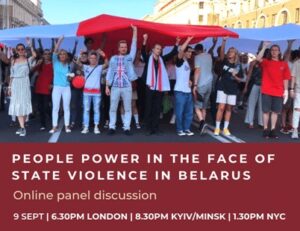 Labelled ‘the last dictatorship in Europe’ for so long and misunderstood by so many, Belarus surprised the world with its unconventional, unexpected and unprecedented protests over the last few weeks. Join us to hear from a panel of experts who have been closely monitoring the situation, including from Minsk, and to discuss how the events in Belarus unfolded, how they compare with the protests in Ukraine and whether such comparisons are helpful.
Labelled ‘the last dictatorship in Europe’ for so long and misunderstood by so many, Belarus surprised the world with its unconventional, unexpected and unprecedented protests over the last few weeks. Join us to hear from a panel of experts who have been closely monitoring the situation, including from Minsk, and to discuss how the events in Belarus unfolded, how they compare with the protests in Ukraine and whether such comparisons are helpful.
The even is organised by the Ukrainian Institute London. The panel’s speakers include Nadzeya Husakouskaya, Alena Minchenia and Nataliya Gumenyuk, and the discussion is moderated by Professor Elena Korosteleva. For more information visit here, and the YouTube link can be found here
UACES Virtual Conference, 7-11 September 2020
 On 8 September 2020, Dr Irina Petrova participated in the annual UACES (University Association for Contemporary European Studies) Conference, this year taking place virtually. She contributed to the panel ‘EU Foreign Policy and External Relations’ with a report titled ‘The Principle of Mutual Ownership in The EU’s Foreign Policy: Towards a More Equal Partnership?’. The panel was chaired by Cigdem Ustun (Nisantasi University), other presentations were delivered by Ayoub AlBahri (Institute of Political Studies, Polish Academy of Sciences, Poland) and Teresa Almeida Cravo (FEUC-CES, University of Coimbra, Portugal). Further information about the conference can be found here
On 8 September 2020, Dr Irina Petrova participated in the annual UACES (University Association for Contemporary European Studies) Conference, this year taking place virtually. She contributed to the panel ‘EU Foreign Policy and External Relations’ with a report titled ‘The Principle of Mutual Ownership in The EU’s Foreign Policy: Towards a More Equal Partnership?’. The panel was chaired by Cigdem Ustun (Nisantasi University), other presentations were delivered by Ayoub AlBahri (Institute of Political Studies, Polish Academy of Sciences, Poland) and Teresa Almeida Cravo (FEUC-CES, University of Coimbra, Portugal). Further information about the conference can be found here
People, Power & Protest: Protecting & Promoting Human Rights in Belarus, 3 September 2020
 On 3rd September 2020 at 18.00, Professor Korosteleva, co-jointly with Doughty Street Chambers, Bar Human Rights Committee of England & Wales, the University of Liverpool, and the Human Rights Institute, organised a public webinar on People, Power & Protest: Protecting & Promoting Human Rights in Belarus. The aim of the webinar was to explore and discuss what options there were in the short and long term, to resolve the crisis in Belarus, mapping recent events from a human rights and a political perspectives. Speakers included Baroness Helena Kennedy QC (Chair); Natallia Satsunkevich (Human Rights NGO Viasna, Belarus); Elena Korosteleva (PI COMPASS project, University of Kent); Kanstantsin Dzehtsiarou (University of Liverpool), Miriam Lexmann MEP (and COMPASS Advisory Board member); Sergey Dikman (Council of Europe) and Laurynas Jonavicius (University of Vilnius), with Bill Bowring (Birceck College) and Boriss Cilevics (Parliament of Latvia) acting as discussants. Full information about the event can be found here, a videolink here and speakers’ biographies here.
On 3rd September 2020 at 18.00, Professor Korosteleva, co-jointly with Doughty Street Chambers, Bar Human Rights Committee of England & Wales, the University of Liverpool, and the Human Rights Institute, organised a public webinar on People, Power & Protest: Protecting & Promoting Human Rights in Belarus. The aim of the webinar was to explore and discuss what options there were in the short and long term, to resolve the crisis in Belarus, mapping recent events from a human rights and a political perspectives. Speakers included Baroness Helena Kennedy QC (Chair); Natallia Satsunkevich (Human Rights NGO Viasna, Belarus); Elena Korosteleva (PI COMPASS project, University of Kent); Kanstantsin Dzehtsiarou (University of Liverpool), Miriam Lexmann MEP (and COMPASS Advisory Board member); Sergey Dikman (Council of Europe) and Laurynas Jonavicius (University of Vilnius), with Bill Bowring (Birceck College) and Boriss Cilevics (Parliament of Latvia) acting as discussants. Full information about the event can be found here, a videolink here and speakers’ biographies here.
Femagora Festival on Gender in Central Asia, 25 August to 30 September 2020
Dr Diana Kudaibergenova participated in the Femagora Festival on Gender in Central Asia which was organised online from 25 August to 30 September. Dr Kudaibergenova led a discussion on uyat (shame) with Dliya Mamadsho, Altyn Kapalova, Umida Akhmedova, and Moldiyar Yergebekov. The conversation was in Russian. Traditionally, the goals of the festival are to highlight the activities of women and the gender situation, to solidarize feminist initiatives, which become especially important during the COVID-19 pandemic and its impact on the lives of especially vulnerable groups and communities. Speakers of meetings and authors of publications – artists, journalists, representatives of national women’s mechanisms, researchers, directors and other experts from Kazakhstan, Kyrgyzstan, Uzbekistan, Tajikistan and Turkmenistan. More information can be found here
